#the cutting and pasting works really well to create a slightly different narrative than the original :')
Explore tagged Tumblr posts
Note
I'd love to hear your thoughts on the symbolism in Did I Make You Up?
YEAH!!! SOMEONE TOOK MY BAIT!!!!!!!!!!!!!!!!!! i will say this is an amalgamation of 6 pieces i've written for various things about this music video ( i love this) so sorry if it flips styles or is COMPLETELY unfocused but to be honest if i sat down to write this i would just be vomiting all this information in an unfocused way anyway. this might be the best you get..... (analysis under the cut)
DIMYU is a retrospective, we need to talk about the music, the video and the lyrics and how they work together to create a narrative. We'll start with the music, as it's a shorter section, and there's less to talk about than the others one of the other things i've noticed and that i personally believe to be the truth is that DIMYU is a slightly continuation of summerland, what with all the references to the summer becoming fall and such ("when you think you really know someone // when you're blinded by the summer sun" and "you were summer // i was fall" , as well as the fact that josh is wearing a school uniform now which can indicate a passage of time i think this can also be backed by the use of orange silhouettes particularly in circles which can convey the sun (i'll touch on orange lighting itself as a motif)
In the first verse, there's the piano overlaid with with a drum roll which is the main use of percussion in the song. The piano is soft and is consistent - plays through the entire song. The drum roll is indicative of something militaristic, regimented - the whole concept of marching to the beat of the drum is to be doing what is expected. So overlayed with a soft piano is the expectations of what a relationship is meant to be - this could potentially symbolise the relationship between the two of them.
Additionally, this could also be Josh's influence trying to control, or change the melody of his ex. She is the piano line, he is the drum. The drum drops out at the end of verse, into a different rhythm.
Although subtle (and yes, I know I am spending way too much time thinking of this), that represents it all breaking apart, coming apart at the seams. This links to the theory of a retrospective because it is all happening in one, not in isolation. This shows us that he's thinking of the story in the past, not the story as it is occurring.
The chorus subverts the expectations set up by the intro and the first verse, most notably with a throughline of melody that subtly undercuts the rest of the song. It's very easy to lose it if you don't pay attention to it. As stated earlier, this melody is very much emblematic of a fleeting memory, floating in and out of the consciousness.
Furthermore, the second "verse" (glorified bridge) lets the piano shine. This could connote freedom for his ex, being able to act as her own person, away from the expectation of what Josh wants her to be. This on it's own does not support the retrospective theory, but then we return to the chorus and think about the composition of the song as a whole, the repetitiveness of the structure really symbolises a circular pattern of thought, getting stuck in the loop, being stuck *in the memory*.
When we come to look at the lyrics, it is so important to note the use of pre-chorus/hook - especially the creative use of it in Did I Make You Up.
It is a single line; "Lost in a daydream."
This line appears 3 times in the song, most often before a chorus. Most notably, it is the first line of the song, prefacing everything.
This line could imply that everything the listener is about to hear is part of a daydream, not real, or fictionalised - supporting the theory that DIMYU is a retrospective. Alternatively, it can be said that this line is Josh being lost in the daydream that the relationship was. The use of hook supports the theory that DIMYU is written as a retrospective. By framing the narrative with a line, Josh sets the expectation of the song and the narrative: nothing is real here - it’s made up.
Furthermore, probably the most damning part of the lyrics that leads one to believe in the retrospective theory is the use of past-tense. “Was I wrong?” “I was summer, you were Fall, maybe I was naive.
This section is without a doubt self-explanatory in it’s relation to the argument.
Additionally, we must talk about the pre-chorus itself;
“Hit me all of a sudden, Shawty, you saw it coming. I was summer, you were fall, Maybe I was naive. Lost in a day dream.”
With the use of past tense; bolded for convenience, when we focus on the actual meaning of the section, it undoubtably screams some form of retrospective, particularly the line of having seen it coming.
If the story were to have been in the present - with a form of direct address, it would make more sense for the line to have taken the form of “Shawty, you’ve seen it coming.”
(i hate myself for the fact i’ve had to write the word shawty in a semi-serious academic context).
Finally, the chorus gives some of the most damning evidence of a retrospective;
“When you think you really know someone, And you’re blinded by the summer sun, Fall in love with who they won’t become, Was it ever real? Did I make you up?”
“Blinded by the summer sun”, a reference to summerland (which is the assumed song the relationship in question started in), implies the passage of time between then and now. Additionally, the summer sun being blinding and having gone away also implies a change of time.
A change in time (and season) continues to support the idea that Did I Make You Up happens in retrospect - a passage of time connotes the idea that relationship has already ended and we are now viewing a deeper inner contemplation of the relationship itself. Finally, the music video;
So I'm reaaaaaaaaallly into colour theory, but specifically only the colour theory used by half alive in the universe it all takes place in. What we know for sure is that; Orange - Daydream/The In-Between/Unreal Natural Lighting/white - Reality As showcased in the still feel. music videos, there are so many other unassigned states of conciousness, with different colours, but we know for sure that these two mean those things. The bit I'm so focused on is the orange because it is so PRESENT in the Did I Make You Up? music video, from the beginning.
It is undeniable to say that the music video for Did I Make You Up is one of the band’s most intense and meaning filled videos to date, and it would be no less true to say that interpreting the video itself is a challenge without the aid of established concepts.
One such established concept is the prominent use of warm orange lighting and motif to convey a sort of dreamlike environment - or, in the case of Now Not Yet, being stuck in the inbetween. Orange has been previously established to be symbolic of this concept, with references as far back as aawake at night and still feel, with the shipping crate lighting, and the vast majority of atmosphere in still feel. until the ending breaks and we’re back to the naturalistic lighting of real life.

It is apparent in videos like What’s Wrong (which I would love to talk about in future too because I love the way the orange and blue meld together into one and it's this dreamlike state of being lost) and Runaway in more naturalistic contexts, but with the same meaning: All of these examples show the same thing: not being real/not really being sure if it is real – and it is no less true for DIMYU. One of the things we begin with is Josh’s head being surrounded by a beam of orange light. Coupled with the line, “Lost in a daydream”, this could symbolise Josh’s head literally being lost somewhere not real - in the in between - being lost in a day dream. During the music video, Josh returns to the orange circle, before the first chorus, and after it.
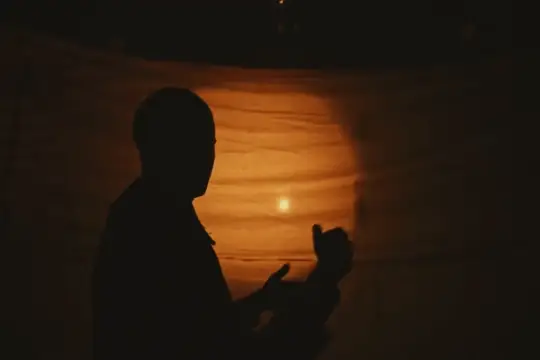
This could symbolise Josh returning to the daydream, thinking it over, (in retrospect, as is the thesis) and it “playing [his] mind on repeat” (Beige), implying that it happened previously.
Finally, one of the most striking parts of the music video is the second “verse” (wasted potential - i think dodie should have been on this instead of Nobody). It is accompanied by a side pan of what can be assumed to be the relationship, all enshrouded by an orange light, implying that the progress of the relationship is playing back out in his mind, which supports the idea that it has already happened.
anway about the dancing
so like, probably intentionally, in addition to the main feature of the uniformed dancing, we've got other things going on (namely the cowboy) that don't take the focus of the scene. this is intentional, probably, because this is a set and if they wanted it to be focused only on the dancers then it would have been focused on the dancers everyone else is going on about their normal business, brett and j are recieving gifts of books, there's a guy just sweeping about, there's a cowboy, later on there's 2 people carrying a cooler etc. etc (basically what im saying is that life as usual is going on around them) but the focus on the camera is still locked firmly onto the dancers and away from whatever else is happening. now i consider, due to the fact that no-one else but josh is paying attention to the dancers, that the dancers are actually thoughts, and i solidify this via the idea that at the beginning just after when the floodlights come on and reveal the scene, they seem to dance erratically and somewhat in line we can also associate these dancer to josh as thoughts seeing as they follow the same clothing scheme (blue school-uniform) anyway, that's just what i think the uniform means now i can talk about other stuff so obviously there's this circular movement with the heads rolling. i dont have a gif for that yet but it's at about i think 34 seconds into the MV i personally think on no basis whatsoever that this is akin to thoughts going round and round in circles due to the very circular and repetitive movement, like how you get stuck thinking about this (ahah this is funny because i've only been able to think about this mv for the past 2 weeks) now onto the main part, josh fights his way through the "thoughts" and then they suddenly come through into a sort of marching formation

they've gone from out of control to very controlled, but they're only controlled for so long before falling apart now aside from the fact that this can be interpreted to be losing and fighting for control of your own mind (especially in a place of emotional turmoil) i find the precise movements of the company (as i will now refer to the dance troupe) to be akin to a weapon of some kind, especially with how josh moves his hands fist, open, slides something into position, aiming towards something, and then the travelling of the "bullet" (pointed finger) towards a "target" (the circle) i think there's a specific meaning to this, being that alongside this movement he sings "hit me all a sudden // shorty you saw it coming". this might be reaching towards a conclusion but i believe that this weapon movement is a bit like the physicality of how sudden the breakup hits finn francis but how carefully planned and meticulated it was for his ex
essentially, yeah. maybe i will revisit this later and reorganise my thoughts, as well as finish adding the rest but this is. this is most of them thanks for the ask!!
5 notes
·
View notes
Note
I'm okay with a bunch of disorganized rambling honestly 😂. But if I had to narrow it down then I guess I want to know about main and side characters and how they compare to the original?
I know that tumblr is the Prime Site for disorganized rambling, but I have perfectionism issues. But that is a great question, nonnie, and I will be happy to ramble is a slightly less disorganized fashion.
When reading Maximum Ride as a somewhat-formed adult who discovered they enjoy English classes about 3.5 years ago, I noticed that JP, when writing, doesn't understand consistency. At all. Which means, in many ways, I have a free sandbox to work with.
Spoilers for my rewrite WIP, because I strongly believe that if a story would no longer be good if one had spoilers, then it wasn’t a good story in the first place.
I'm trying to keep the backstories the same, plus or minus the scientific method and a few characters (RIP my OCs. I want to bring you back so bad but it wouldn't fit with the thematic narrative). I've mostly kept their (starting) abilities the same, too. Without further ado, I'm going to introduce some WorldBuilding. (If I'm good at nothing else, I'm good at world building)
First off. Logically.
How are they getting Cable?
How are they getting internet?
How are they getting money to eat and stuff?
JP's answer: handwave it off. Sometimes you need to ignore logistics for the sake of plot. This is an answer I'd accept from an author that I like, such as Julie Kagawa, that makes amazing worlds, characters, and narratives that I will happily handwave a few things that wouldn't work in the real world. James Patterson, on the other hand, did not make any of that; he made a cool concept, some good rough-draft characters, and nothing else, and therefore this is an unforgivable sin.
Wasp's answer: They are not getting any of that.
Introducing Cottagecore.
The house is off the grid. Solar Panels and a wind turbine create electricity. They have their own well. They grow their own food, raise livestock for eggs, milk, and wool, and trap fish for meat. They get money through dumpster diving and pawning. They still have to steal half of the necessities they can’t make themselves. They do have a TV, but it can access about three channels on a clear day. Internet is only a thing when they go to the public library.
Giving the flock a background that’s heavy in farming and livestock rearing shores up the plot holes mentioned above, but in my opinion, ties the flock more tightly to the environment, thus giving them something tangible to lose when they have to leave the E-shaped house. Because they’re not just leaving a house and a safety net— they’re leaving their entire way of life with no promise of getting it back. It also gives them a tangible connection to the earth in case I want to actually pursue the global warming themes.
Main Characters
Maximum “Max” Ride (Birthname: nonexistent)
First off, I'm letting her be Latina, James Patterson.
In the original, Max was very much the headstrong, independent, action girl. Leaning into Strong Female Character (TM), but overall she had a strong, solid foundation and enough character consistency through the first three books for me to not have to just make an entire new character. However, I felt that she was, in some ways, a bit too Action-Girl and Strong and Capable. Yes, Max is incredible and competent, but she’s also fourteen. She’s a child.
In the rewrite, Max’s character is still headstrong, independent, capable, and sometimes not the best at listening to others. All of that’s the same. But she’s that way not because of girlboss energy, but because there’s no one else to do it. She doesn’t want to lead, necessarily. She wants to get some rest and let someone else handle the problems life keeps throwing at her. But she knows if she did that, the responsibility of leader would fall to Fang and Iggy, and she can’t ask that of them. She doesn’t want to place that burden on anyone else (Look, there’s a reason I chose Ayano’s Theory of Happiness as one of her signifier songs, okay?). Her narrative is very much centered around burden, and also around loss. She lost her cultural heritage when she was taken away from her birth family, she lost her childhood to being a leader, she lost a good deal of her friends to the school (RIP my OCs), she lost Jeb, and then she lost her stability. And she’s going to lose a lot more before the end of the story. So a lot of her character arc deals with learning that there are some things she can’t fix, some things that can’t be recovered. She can’t get the E-shaped house back. She can’t get her Little Baby Angel back, even after they rescue her. She can’t get her friends back from the school. And instead of working so hard to recover those or find something to replace them, she has to learn to live with that sense of loss and move on with her life without feeling guilty for leaving things behind. And she has to learn that asking for help and sharing her burden is selfish or weak.
Other changes I made that don’t necessarily fit into her narrative arc, but you asked for rambling so rambling you shall get:
Max hallucinates, because mental illness is also a prominent theme in the rewrite. She doesn’t have a psychotic disorder, but her C-PTSD causes visual/audio hallucinations, especially when she’s stressed or sleep deprived.
Max ends up having a Gender Discovery throughout the story and goes by He/She pronouns eventually. I don’t know when, but it will happen.
As far as genetic modifications/special quirks go, she can fly faster than the rest of the flock, but not 300 miles per hour. She averages about sixty mph with diving speeds of 240. She cannot breathe underwater or shut down her organs on command. She also has the Super Special Power to predict the weather, but that’s not because of genetics, it’s because she has chronic pain in her right arm that gets worse when weather fronts change.
Her favored weapon is her trusty rebar that she picked up from a condemned building. I think she’s going to name it eventually but I don’t know what yet.
Fang (Birth name: Gabriel Xue)
In canon, Fang is characterized in early books by being the “dark, strong, silent type”. He’s probably the most reserved member of the flock, to the point of falling into the Brooding Mystery Man trope in parts of the book. They care a lot, but they’re not the best at conveying that, especially with the younger members of the flock, and at times their high empathy leads them to making mistakes. Despite the high empathy, he’s often compared to a robot due to his lack of expression and external emotions.
Well, first change is that they’re not a man, so jot that down—
If Max’s narrative is centered around burden and loss, I would probably say that Fang’s is centered around humanity and moving on. None of the flock was treated as human while in the school, but Fang was more often than not treated like a wild animal due to “behavioral issues”, and therefore had and continues to have a difficult time considering themselves real and alive, let alone human. This manifests through a several different ways— where in canon Fang definitely had a ‘fight’ reaction, in the re-write they have a ‘freeze’ or ‘shut down’ instinct. They’re selectively mute for multiple reasons (including derealization, jaw pain, the fact that they didn’t learn how to speak until they were 10, and genuinely forgetting it’s something they’re capable of), a period of Cotard’s syndrome, and a tendancy towards self-loathing and self-sacrifice. In short, Fang is still halfway stuck in the mindset that most of the flock grew out of when they escaped in the school, and doesn’t know how to move past it.
Much of their character arc revolves around not necessarily seeing themselves as human, but learning to treat themselves as human even when they don’t feel like one (or even feel real), and knowing that just because they don’t feel human all the time doesn’t mean anyone else can treat them the same. They never start easily expressing their emotions, and they’re always going to be selectively mute, but they learn to accept that those aspects of themself aren’t character flaws or signs that they’re sub-human.
Other additions to Fang’s character include:
They don’t get their hair cut in New York. It stays long through the entire series. They have the longest hair in the flock by the end of the series, and they can wear it in so many styles.
Fang uses they/it pronouns because themes of reclaiming the weapons used against it and, more importantly, Gender.
They’re actually really good at spelling compared to the rest of the flock, because they and Iggy communicate with Print-On-Palm when they’re nonverbal, and they’re nonverbal for some pretty long stretches of time.
They and Max have... zero romantic tension. At all. There is none. The number of times Max calls them her sibling/little sibling in the first arc alone is staggering, and that will not change.
Igneous “Iggy” (Birthname: Jamsetta “Jamie” Griffiths)
I’ve talked about Iggy before. Canon doesn’t give us much to go off of, but from what’s shown, he’s smart, sarcastic, has sharper edges than Fang and Max, and also has a sizable ruthless streak. So that’s what I have to go off of.
The big difference between Iggy and Fang&Max is that Iggy has a much better memory of the School. Most of the flock have areas (months or years) that they don’t remember, or people that they’ve blocked from their mind, but Iggy... doesn’t. So he’s the one that remembers all of the other AVIAN test subjects that were old enough to have names and identities but died due to complications. Max might have the burden of leadership, but he has the burden of memory. And that has lead to both a massive fucking guilt complex, because why did he survive when they didn’t, and, as mentioned above, a ruthless streak that he doesn’t shy away from.
Which is to say, by the end of the story, Iggy has the highest kill count.
I love, love writing Iggy next to Max and Fang. I love writing Iggy next to Gazzy and Nudge. Because, I say this with all of the love of the world, but Iggy is not a good person. He is loyalty and love incarnate, and the world can burn down if he and his siblings are safe. Max and Fang will always try to save as many people as they can. They will wonder what’s wrong with them the first time they kill and don’t have a mental breakdown about it. They are good in a way that Iggy is not. He’s okay with killing Erasers. He’s okay with killing humans. He’s okay with killing people who might not necessarily deserve it, if they show themselves as a threat or are simply in the blast radius. He knows perfectly well that most of those Erasers he’s murdering are four and five and he is okay with that, because a lot of the AVIANs were that age when they died. (Yeah, in the rewrite it’s not Fang who has an issue with Ari; it’s Iggy who wants the 7-year-old wolf-boy dead.)
And this is, of course, juxtaposed with Iggy being really, really good with Nudge and Gazzy (especially in the beginning). Because, again, he actually remembers being a child. He remembers a lot of kids that died and is therefore fiercely protective of the kids that didn’t, as well as fiercely protective of the innocence that he never got. So he’s the one that cooks their favorite foods when they’re having a bad day, always makes time when they want to talk about something, and convinces Max to let them go to that toy store in New York because, yeah, he Max and Fang aren’t kids. They never were. But Nudge, Gazzy, and Angel can be. (And if he has to be a murderer to preserve that, then he’s perfectly okay with that.)
He and Angel don’t get along very well, though. The telepath doesn’t like hanging out with the person with the most clear memories of the school.
Other additions:
Iggy is trans and says trans rights
He also has paranoid episodes, because C-PTSD. Sometimes they’re very helpful. Sometimes they are not.
I actually decided that he’s one of the flock that doesn’t meet their parents. I know in canon he did, but I always found that very clunky because it didn’t add to his character. He was one of the characters who, until it was convenient for the plot, seemed to care the least about his family. I’d much rather give that to a character whose arc would benefit from it.
Iggy! Gets! Older Sibling Rights! Seriously, he’s two months younger than Fang, he is just as capable.
Iggy does not know braille because Jeb decided it wasn’t necessary for him to know. Iggy is also the best speller in the flock, because Print-on-Palm was the only way to talk to Fang for a solid year. Yes he mocks everyone over this.
Iggy is the only member of the flock that enjoys swimming and can take into the air from water. Everyone else in the flock is incredibly jealous.
Nudge (Birthname: Monique Robinson)
If Iggy is defined by his memories, Nudge is his polar opposite. She was seven when she left the School, but she has next to no memories of it. She is missing a lot of time in the first year she escaped. And that causes... a lot of things. It makes her feel disconnected from her older siblings, it gives her the ability to function in society in a way the other’s can’t, it lets her feel less grief over the ones that didn’t make it and she doesn’t remember, it makes her feel guilty that she doesn’t remember what she’s old enough to know.
Basically, in order for me to keep the character of Nudge as I saw her (more extroverted, not afraid of the world, fascinated with humans like her siblings aren’t, desiring to fit in instead of isolate), I had to put a little bit of distance between her and the flock. Of course, she loves them— that will in no way change— but she’s old enough that she should remember the school (and her dead friends) unlike Gazzy and Angel, but she can’t, and she very much fears forgetting the flock if anything happens to them. So she’s trying desperately to keep the flock close and wants desperately to experience the world at the same time, and doesn’t know what to do when she can’t have both. That’s her biggest character conflict throughout the series, along with that in-between area where she’s not quite where her older siblings are but understands so much more than Gazzy and Angel, and where she stands in that.
So yeah. Nudge’s journey is that in looking for belonging in the world, in her family, and in herself.
This is why she’s one of the ones that gets to find her parent, James Patterson.
Other additions include:
She never straightens her hair. Never. Her resources at the E-shaped house aren’t perfect, but she still has learned how to take care of her hair and has a few styles she cycles through.
She becomes the default person Max sics on people when the flock is trying to befriend them. Also their de-facto diplomat around strangers.
As in canon, she does take some time away from the flock to expirience ‘normal life’. This does not last long due to the stress of being separated from her siblings/not being able to help them and [REDACTED]
Nudge is... not the only person in her head. I’m not focusing on it much because she doesn’t actually know and neither does the flock (I don’t know if they ever figure it out during the series, either), but she has dissociative identity disorder. She’s not aware of her alter(s?). Her alter isn’t super aware of her, either.
The alter that I’ve developed is named Oxy and is not super aware of the outside world. In her eyes, she’s still seven and they’re still at the School. She would not recognize the body as her own if she looked in a mirror.
Nudge actually leaves the flock for a while to pursue her dream of living a normal life. She deserves it. She learns how to make muffins and the basics of software development. These things are unrelated.
Gasman (Birthname: No first name, surname “Falk”)
Honestly, writing Gazzy is kind of hard for me. Partially because I’m not great at writing kids, and partially because I feel like he’s a pretty surface-level character in-series that... isn’t super compelling in canon. But even if that’s the case, I try to treat all of my characters with respect, so here we go. In my rewrite, he escaped when he was four, which was half a lifetime ago for him, so his memories are ill-defined. Therefore, he managed to circumvent a lot of the trauma that the rest of the kids have, and not in the way Nudge did, which is by creating an elaborate blockage in her memories.
Which means Gazzy... really doesn’t know how to deal with all of this traumatic stuff happening. So much of his development turns out to be a coming-of-age narrative. Learning how to deal with the horrors of what his siblings grew up with. Learning the fears that they had the entire time. Losing his innocence when everyone around him never had it in the first place, and being so terribly alone because of it. Because, really, how can you explain such a deep loss to people who never had what he had? How can they help in a way that matters?
Also, relationship-wise, I’m slowly deteriorating the relationship between him and Iggy. Slowly. Or, changing it, at least. Gazzy hero-worships Iggy in-series, and for good reason, because Iggy is super cool, especially in the eyes of an eight-year-old, and especially when Iggy has taken care to cultivate parts of his behaviors to be child-friendly. Part of growing up is seeing the flaws in your heroes, and Gazzy has to learn how to deal with it. End of the series Gazzy is much less closer to Iggy than beginning of the series Gazzy, and neither of them are really okay with that, but they learn to live with it, because that’s really all they can do.
Notes:
I’m keeping the mimickry! It plays a bit of a bigger role because that’s how Gazzy learned to talk. I’m debating whether or not he has his own voice or if he just borrows the flock’s as he sees fit. He also uses it to scream really loudly and occaisonally burst the eardrums of Erasers.
At one point he cosplays as Jessica Jones. No you don’t get any more context than this.
He has a horrible sense of fashion.
I’m changing his name eventually because it sucks. He’s either going to change it to Gannet, Garrison, or Ivy Mike temporarily, and permanently to Zephyr. (I never said I was going to make his name GOOD, because he’s eight, but it’s changing. You’re welcome.)
Angel (Birthname: No first name, surname “Falk”)
It’s just... a completely different character, at this point. I’ve changed so many things about her in an attempt to make her consistent and act like a six-year-old and work in the whole “telepath before she has a solid sense of identity”, so it’s a different character. Also, I’m tired of writing coherently or in paragraphs, so have some interesting facts.
She has epilepsy! Super severe epilepsy! I think she might also develop juvenile MS in the future because her brain has so many scars from being a fucking six-year-old telepath. There’s no way she could get out of that unscathed.
She has more memories of the school than Gazzy, but only because she keeps accidentally reading the minds of Max, Fang, and Iggy. On a related note, she interacts with Iggy as little as possible.
The mind reading means that she has a hard time developing as a normal child with a normal sense of identity or reality. She can’t tell how much people are individual people and how much they’re just extensions of her. Conversely, she can’t tell how much of herself is actually her instead of the thoughts/opinions/identities of someone else. It’s... kinda fucked? But also super not-her-fault.
She’s albino because white wings. Also, because I thought it was cool. This also means that her vision sucks, though. Also she has the biggest straw sunhat and the most stylish sunglasses a six-year-old can have.
She’s responsible for Max shaving her hair off.
She has the highest swear count because I think it’s funny. She’s the only person allowed to say the fuck word in writing. Everyone else can only say ‘hell’ and the occasionally ‘damn’ but she can say whatever she wants for dramatic and comedic value.
She is NOT THE FUCKING VOICE, J*MES P*TTERSON.
Honorable Mentions
Jeb
I’m skipping Jeb because of how little I care about him. He’s a little bitch, next character.
Ari
STILL HASN’T BEEN REVEALED AS AN ERASER. I’ve been writing for 50,000 words and he’s over here saying ‘nope nope not yet, not dramatic enough’. He’s had speaking lines but has refused to make himself known to Max. I am so frustrated with this seven-year-old wolf-child that I’ve already considered how I would kill him, if I decide I want to kill yet another child in my writing.
So, my main thoughts for Ari is that he... really just drew the short end of the stick in every possible way. While Jeb didn’t sign him up for Eraser expirimentation, he didn’t do anything to stop it, and pretty much cut his losses when he realized this expiriment made a wreck of his ‘perfect, unflawed’ son, because Jeb doesn’t consider children of any species to actually be humans. So, Ari really hates his dad, which makes things complicated, because he also really loves his dad and really wants his approval.
Which means that he also really hates Max, because she’s the child that always got Jeb’s time and attention, even when Ari was human. I think, on some level, he knows that trying to tear Max down to a less-favored level isn’t actually going to help his situation— infighting for the love of an abusive parent won’t make them any less abusive— but he’s also seven, and his development is already severely stunted due to becoming an Eraser, and he doesn’t see ‘leaving ITEX’ as an option like the Flock does. ITEX is his everything. It’s all he’s ever known, and they tell him he’s doing the right thing, and he wants them to love him. He wants his father to love him. He knows that if he ever questions ITEX, his father will never love him. So it must be his older sister that’s ruining his life and being a horrible child, and once Ari drags her back down to his level, Jeb will realize who the best child is and love him properly again.
Ari, on an even deeper level, does care for Max quite a bit, because she’s his older sister and he wants that to mean something in a way that ‘Jeb being his father’ obviously doesn’t. He wants what she made for herself, and he hates the Flock because she loves them and obviously doesn’t love him.
Ari, if anything, is the product of neglect, and both loves and hates everyone who shows a chance of caring about him. And he’s seven, so he can’t notice these patterns, let alone break them.
So. Notes!
He doesn’t look like an adult. I thought that was gross and unnecessary. He’s seven, but he looks closer to thirteen or fourteen. Still young enough that he looks like every Eraser’s little brother, and the Erasers high-key treat him like it.
On a related note, he’s the only Eraser who can talk. The others don’t have the mental capacity or vocal structure to replicate human speech, but they can understand language (at about the level of a two or three year old) and are very good at nonverbal communication. This is why Ari managed to climb the ranks despite only having three years of “service” and also looking like a tween.
He doesn’t have an expiration date because that is SUCH a stupid plot point.
I’m giving him a chainsaw! I don’t know how, I don’t know when, but he deserves to have a chainsaw and GODDAMN I will give it to him.
Emergency and Gene
The OCs that I love and also killed pre-series. They don’t have any scenes, because they’re dead, but their deaths greatly effected Max, Fang, and Iggy, and they are very commonly referenced. Their voices are probably Max’s most common hallucination, to the point where she sometimes pretends they’re ghosts that she can talk to. They’re not ghosts. They’re dead.
Dr. Valencia Martinez
I’m actually keeping her pretty close to canon— loving, supportive, the type of person to take in a gsw victim with minimal questions. The difference is that rather than kindness fueling her actions, it’s incredible guilt. She has three goals surrounding Max: Give her as much support in any way she can, teach her as much about chicane culture as possible, and never let Max know that she’s her birth parent.
(She’s probably going to fail at AT LEAST two of those, but it’s the thought that counts.)
Notes:
She has a pet fox named Robin Hood that she rescued from an exotic animal salesman that got arrested.
I think I’m going to kill her. I don’t know yet, but it’s on the table.
Anne Walker
Y’know, the fake FBI Agent. Who’s not actually a fake in my story because I hated that plot point. She’s genuinely an FBI agent who put the Flock into pseudo-witness-protection in order to build a case against the Institute of Higher Living, accidentally got attached to her prime witnesses, raised them for a few months, realized a [SPOILER] and promptly had to let them get the hell out dodge.
I really like the Anne Walker that lives in my head. She is a VITAL part of the Flock’s development, their mental/emotional recovery, and adding to their safety net to fall back on. She serves them as their first adult role model, and is the first adult to show them what parent/child are supposed to look like from a healthy perspective. Though she has several fuck ups, she becomes someone that the Flock genuinely trusts and loves, which makes it all the more difficult for them to leave when [REDACTED].
Notes:
She and Max do butt heads initially, because Max is paranoid and also afraid of becoming uneeded. This ends up being incredibly important because Max needs to learn how to live and find meaning in life without being the designated Leader/Parent/Big Sister
Anne, at one point, sits the entire flock down to teach them about consent, which was something no one ever talked about with them before. She goes in talking specifically about consent in a romantic/sexual sense (because they’re fourteen and that’s something they need to know), but quickly turns into a full-fledged no, people are NOT allowed to do that to you, what the FUCK.
She’s responsible for giving the flock a laptop. It’s because Angel is online schooled (bc telepathy makes actually learning difficult) and was therefore provided with a computer.
Anne is also allowed to swear, but only when it’s funny.
Michael “Grey” Rivers
Aka Grey from the Sewers Aka GR3Y H47 Aka Mike from the Bronx Aka Gifted Child Syndrome Incarnate Aka Would-be-in-MIT-if-his-parents-weren’t-horrible. He’s my son, your honour.
Basically, his backstory boils down to him being a genius, getting into MIT at 14, his (horrible) parents wanting a perfect child who could “make it out” of the Bronx and represent his family/neighborhood/borough to the world. When he inevitably failed their expectations due to stress, a schizophrenic-spectrum disorder that completely alienated him from the rest of his support network, and refusing to take his psych meds because the side effects were horrible and they made it harder to think (and therefore pass his classes), they kicked him out. He fully intends to go back to MIT when he turns 18 and has control of his finances/scholarships/medication/therapy.
So that’s how the flock meets him.
Mike ends up in a very prominent support role for the flock both in technological persuits (helping them track their parents, helping them get information from ITEX, trying to disable Max’s chip and failing multiple times until it becomes a matter of personal honour—), in helping the older members of the flock figure out how to deal with hallucinations/delusions (because he’s actually been to therapy, unlike them), and in being one of the only people who talks to them and helps them without any ulterior motive. He’s not trying to build a case against ITEX/The Institute of Higher Learning, he’s not double crossing them, he’s not plagued with guilt. He just genuinely wants to help them, and they genuinely want to help him, and that’s their first introduction to a healthy, non-codependent relationship.
My many disorganized notes on Michael Rivers:
He’s from specifically Morris Heights, Bronx, NYC.
He would say that his last name is actually Rivera, but his grandparents changed it to Rivers so it would sound more English, and his family has been in America for so long that he doesn’t know much about any Latino heritage he may or may not have. He identifies as African American, not Afro-Latino. He’s just bitter that his family felt the need to change their surname to have better opportunities in New York.
Nudge aggressively befriends him pretty much the moment she meets him, bullies him into teaching her how to code, and he very quickly adopts her as his pseudo-little-sister.
His delusions in the book seemed to involve government conspiracies, but as that’s the one delusion that is proved correct in the book, I’ve decided it would be best if his delusions and reality intersected a bit less if I don’t want to write him having a manic/paranoid episode in the second scene he has screen time. So his delusions are more based on “none of this is real”, “someone is recording everything I do and setting me up to fail” and “my ill-wishes on people can and will come true if I dwell on them too long.”. Government conspiracies are one of things he is skeptical about because he thinks most conspiracies are either “CIA admitted to this twenty years ago” or “antisemitism”.
He’s taking online free college classes that don’t actually give him any college credit, but they have good information and help him feel like he’s working towards something. He plans to double major in computer sciences and electrical engineering, minor in marine biology. He’s wanted to join NOAA since he was twelve and he is nothing if not stubborn.
There you go. These are my characters, now. I have custody.
35 notes
·
View notes
Text
The Rebel/叛逆者: A Review of Sorts
After being only semi-invested in the Rebel, I ended up getting so into it in the final weeks of its release, I’ve shelled out on IQIYI premium just to get the final couple of episodes a few days earlier.
That’s right kids, it’s a Review of Sorts. Unfortunately, I could not find a translation of the novella the drama is based on, so will be looking at it as a separate entity.
Most of this post is spoiler-free, however I have dedicated a few paragraphs at the end of it to discussing the final episode, as there are a few specific things about it I wanted to mention. There is a clear spoiler warning before that part.
If you don’t want to risk it, TL;DR version of this review goes something like this: Rebel is very decent, and positively one of the best things that I have seen to come out of China since I’ve jumped into that particular rabbit hole. It’s pretty well written, it’s very beautifully dressed and shot, and the cast is killing it. I thought it dropped the ball a little in post production, and I did not always love the pacing. Other than that, it’s incredibly decent, and well worth watching, unless communist propaganda really irks you, in which case stay very well away.
I have been having many conversations with @supernovasimplicity all the way through watching this drama, so there are likely to be some thoughts here that are influenced by those.
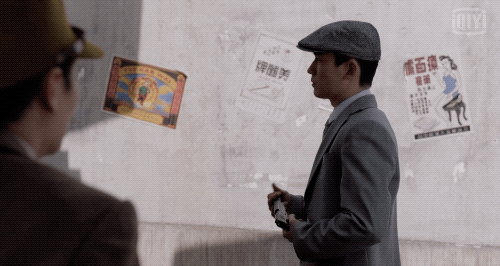
The story centers around Lin Nansheng, a struggling servicemen in the Guomingdang party. He has a great analytical mind, and absolutely no emotional capacity for his job. He has trouble handling violence, he is impulsive, he cannot speak to his superiors without bursting into tears, and has nothing even remotely resembling a poker face. And that is what makes this drama as enjoyable as it is.
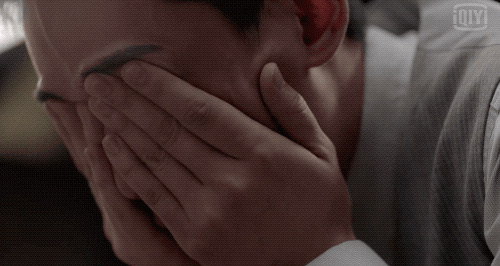
I don’t think Lin Nansheng’s journey would have been nearly as exciting had he started it from a place of competence. He botches up everything he touches because his big brain switches off the moment his emotions kick in. And so, when you see him grow in confidence, learn to control himself, learn to fake his smiles and compliments, you can’t help but feel a strange sense of pride. It also makes Lin Nansheng very likeable as a character for reasons other than Zhu Yilong’s ability to look like a bush baby.
It did take me a while to feel fully engaged with his performance - not because there is anything lacking in it, but just because it’s hard to be truly surprised by his choices after the exposure I have given myself to his work. That said, at about a half-way point I got charmed by him anyway, and there were quite a few scenes that were truly mesmerising. There were scenes where he broke out of the familiar mould of big unguarded eyes and fluttering wet eyelashes, and tried something that was not pretty: every time to a great success. I am hoping to see more of that in his future work.
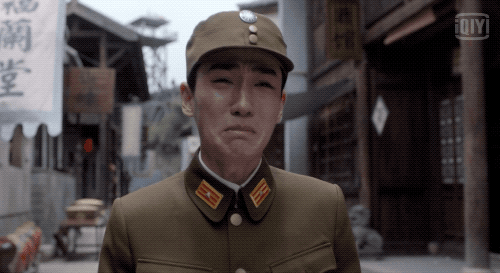
I really wanted to like the female lead, Zhu Yizhen, but unfortunately both the way she was written and the way she was performed by Tong Yao left me somewhat cold. It did not help of course that the screenplay ended up sidelining her at every turn, leaving her with very little personal agency. She was set up so interestingly, but in the end her sole purpose became being someone for Lin Nansheng to pine over. It is particularly curious from a perspective of meta storytelling: seeing how this is all centered around superiority of communism, which as a whole was, arguably, ahead of its time in the matters of binary gender equality.
The ensemble cast of the drama is stunning. Wang Yang came very close to stealing the show at several points as Chen Moqun, somehow managing to make his rather unlikeable character interesting. I can say the same thing about Zhu Zhu who absolutely shined as Lin Xinjie, showing an incredible range and imagination in her performance.
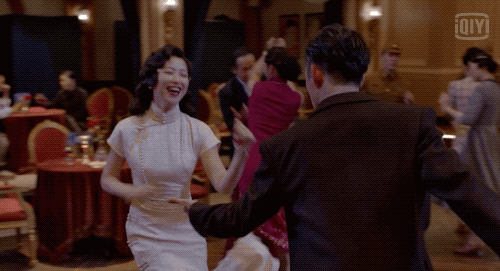
The overarching story of the show is engaging, with some incredibly suspenseful elements; every narrative arc including a nice progression through it. As spy thrillers go, it was fairly well plotted. You could if you go looking for a few things that did not pay off in a satisfying way (notably, the Chekhov’s cyanide capsule), but you overall the story really was well told for the most of it.
I did, however, feel like the pacing started to fall apart in the last quarter of the drama. Last episode in particular really did feel rushed, not just due to its pace, but also in a way it failed to pay off the final mission in any visible way. There will be more on that in the spoiler section of this post.
Important to note that The Rebel is a show made in Communist China in the year 2021. It does not ideologically side-step from the path that was laid out for it by that fact. Which is to say, it is, undeniably, filled with propaganda. Communists are the good guys, and if you think a good guy (or gal) is not a communist, they probably secretly are. With one exception of a friendly character who is not a communist, and whose fate we actually never find out. Curious, that.
The Rebel is not a kind of a show where censorship-appeasing scenes are shoehorned in. It’s a kind of a show in which the main theme is Sacrifice For the Party.
Aside from the being the moral vector of the show, Mao’s gentle teachings explicitly help get Ling Nansheng out of prolonged depression following his injury, and almost annoyingly, this sat incredibly well with the character, as he was written. Lin Nansheng is conceived as this naive idealist who wants to be on the front line, who needs validation and support of others. His - and I can’t believe I’m saying this - his being disillusioned in his beliefs and choosing to join a party which includes people whom he likes and trusts makes sense. Him finding this one thing that gives him hope and letting it propel him into gaining confidence and competence makes sense.
In many ways, the Rebel is a story of Lin Nansheng’s failure to become an antagonist within the world of the drama.
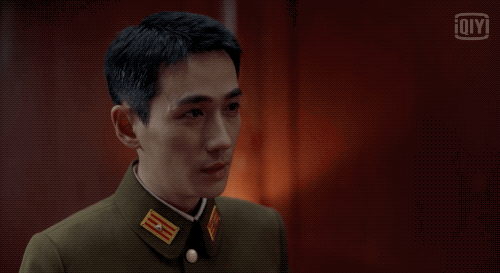
I have honestly spent this past couple of weeks pondering whether being well written makes political propaganda better or worse, whether the subtlety of it makes it more or less palatable, whether it’s enough, as a viewer, to be aware of it to shrug it off. Ultimately, this is not something I could or should make moral judgements on, but I do believe that it’s possible to acknowledge the fact that propaganda exists in the drama, and still appreciate it for a good piece of television that it is.
That said, I am very well aware that me being kind of okay with it stems entirely from my own removal from the culture this is made in, and I am, perhaps, lucky to even have a choice as to whether I want to engage with a product which is, undoubtably, here to dress political ideology in fancy clothes.
I have, on the other hand, also seen many things in Russian media of the “Annexation of Crimea is Good Actually” variety and those make me feel very unwell, so feeling somewhat at ease with blatant political propaganda in Chinese media makes me the biggest hypocrite.
But, I digress.
Before we go into some specific plot-related things, I would like to mention that the Rebel has this weird dichotomy in which the production is sublime, and the post-production… not so much. The show very well shot. Every element of it sits perfectly together, not a single prop out of place, not a single extra underdressed, not a page of script not put to good use. It’s lit to perfection. It’s scored beautifully. So much of this show is just stunning.
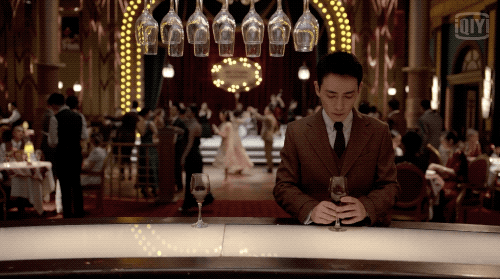
And then… there is post-production.
This is not even about bad CGI (and the CGI is, indeed, bad), it’s just that most of post-production as a whole feels rushed.
Starting with surprisingly imperfect editing, which at times just fails to make the scene flow together. The final line of dialogue would be spoken within a scene, and it would fade to black instantly without a single breath to indicate a full stop. A montage sequence would be created, but every shot within it condensed to a second, making it feel incredibly fast-paced when the effect should be the opposite. There would be a cut away from a speaking character and to the same speaking character from a slightly different angle, making it dynamic without any reason to do so. There are a couple of truly startling jump-cuts.
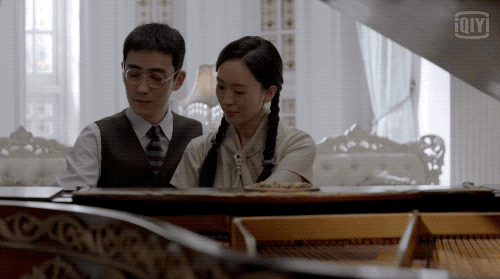
I did not speed this gif up. This is part of a romantic montage, edited like it’s a goddamn action sequence.
And of course dear old friend slowing down footage shot at 24FPS. Please don’t do this. You think no one notices - but we do.
There are other tell-tale signs of production rushing to the finish line: occasional, but very noticeable ADR glitches, very sloppy job done at sound mixing, which contribute to parts of the show feeling ever so slightly off.
It’s not unforgivable, but it does make me wish the same amount of care and efforts that went into shooting this drama would also go into it after it was all in the can.
Oh, and just because if you know me you know I have a professional fixation on fights, and I am happy to say most action scenes are toe-curlingly delightful. Hot damn those fights are good. I am absolutely in love with the shot below, for example. Placing an actor behind a piece of set so he can exchange places with the stunt double during a one shot is such an old trick, but the execution, timing and camerawork are just... flawless. This is what perfection looks like.
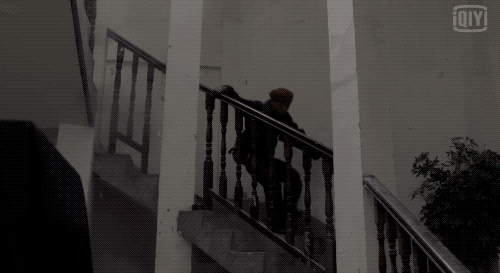
Now we got all that out of the way...
SPOILERS FOR THE SERIES FINALE BELOW
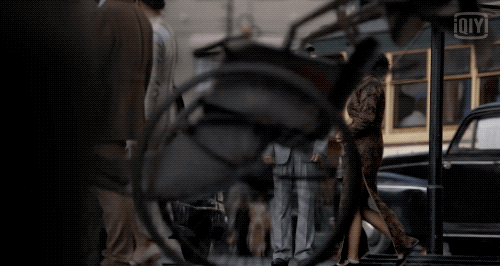
Here’s the thing. I wanted to love the ending and I found that I could not.
The final mission was presented as important, and honestly the scene in which Zhu Yizhen is sending the vital message out as Lin Nansheng holds his ground in hand to hand fight is incredibly dynamic. Party, this is due to the fight itself being incredibly well choreographed, yes, but it’s also where it sits within the narrative, how high the stakes are for everything surrounding it.
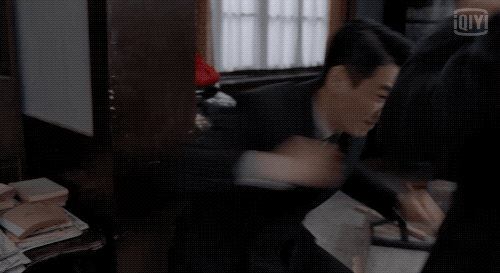
But then, the tension all but bleeds out. The Important Message is sent, the fight is won, and we are treated to ten minutes of a very slow car chase, problem of which is not even its speed as much as its placing within the story. As in, by this point both of those operatives have lost their cover, and completed their Very Important Mission. It would be very sad if they died, but their survival does not technically contribute to their cause. Moreover, Zhu Yizhen getting mortally injured in order to protect Lin Nansheng as part of her mission read a little empty when the mission is technically over.
While I personally found Lin Nansheng slow recuperation and his low key ending enjoyable, I think I would have preferred to have seen a more tangible pay-off to all the sacrifices made in the name of “bright communist future”, just a little more justification for every moment of death and despair we witnessed. I would have certainly at the very least preferred to see Wang Shi’an’s death on screen. Considering how many likeable characters martyred themselves on screen, denying us the death of the one antagonist just seemed cruel.
I really did love the ambiguity of the final few scenes however, if we consider the children choir at the end a fantasy. The idea that Lin Nansheng will live out his life in this hope that Zhu Yizhen is still alive, imagining her just outside of his field of vision, his only joy being in this fantasy of her… now, that is incredibly strong. I equally like the idea of rest being promised to him at the end of his journey, and said rest being painful, and slow and unwelcome.
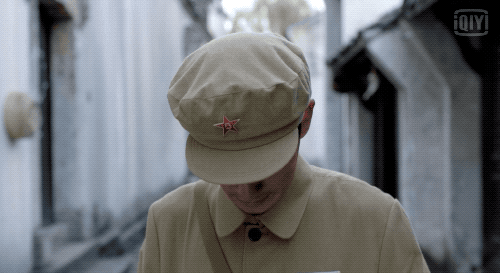
But it felt like as they chose not to to lean into the “sweet” part of the bitter-sweet tone of the ending and we’re unable not commit to the “bitter” part either, so it lands with a splat which is somewhat lacklustre.
---
This concludes my thoughts on the Rebel.
I am more or less out of Zhu Yilong’s filmography to watch, which is probably a good thing at this point. I have just emerged out of several back to back work projects - literally today - and will hopefully once more have time for things I grew to enjoy doing during the lockdown.
Those things, if you have not guessed, include watching Chinese television and writing things about Chinese television.
45 notes
·
View notes
Text
Making Of Featurette - Build An OC
Some of you may have seen my post yesterday about how to introduce an OC and met my new gal, Phyl, who seems to have broken a land speed record on acquiring fans.
The challenge posed yesterday - or more, the question - was how to introduce an original character, but it was also sort of a fun exercise for me to take a look at my process for creating a character from scratch at the same time.
There was some discussion about whether including the Toccoa training sequence was necessary, and while that applies to a large number of BoB OCs, many of whom find themselves included in the unit for various and sundry reasons, it doesn't apply to all of them, so part of the spec was also to create someone to whom that rule wouldn’t apply.
But why ask that question? The opening scenes at Toccoa serve a specific storytelling purpose - they establish the relationship between Sobel and his men, paint a picture of a difficult training program, and create an environment to explain why these men bonded like they did.
The larger issue here, then, isn't about whether training was important, but rather 'Have your given your character believable context and backstory and set them up for success within the narrative?' For some original characters who are being included in the unit, that context and their integration is essential to the story. For others, that context will need to come from somewhere else.
We also talked about a character's 'purpose' within the narrative. For most of my fics, I start with a specific romantic purpose in mind, but I didn't have one of those here, so I started with a wartime service - the WAAF - and a name. I used common 1920s UK name lists and a random name generator to assemble some possibilities. Having a name to roll around with helps a little, sometimes and can change, too!
The Women's Auxiliary Air Force fills a wide variety of roles within the RAF, but a great number of jobs for women are in technical positions, learning new technologies like radar and range-finding. Assignments at stations closer to the channel would be much busier than those further inland, which solves two problems. One, it means my OC is closer to Aldbourne, which is in Wiltshire, well out of the way, and two, a sleepy station allows for much less technical knowledge because I don't have to describe people actually using the equipment they're seated next to.
So - Air Aux, very technical, (so she's smart) slow assignment (so she's either not good at her job or she asked to be here?). People get bored all the time at work, so they bring stuff to do. My OC needed some stuff. I had a thought that the British Intelligence Services solved a recruitment problem by putting out an advertisement for people who enjoyed solving crosswords. This was a covert way to get in people who were interested in language and could see patterns and think critically. They're cheap, they're published in a lot of newspapers, they're a good way to pass time on a long shift.
Puzzles are always better with a freind, so I started writing some dialogue between unnamed OFC #1 and OFC #2, later Phyllis and Bernice.
Unkempt women, nine letters.
Us.
I think that leaves us a bit short, I said nine letters. Slatterns! Right, thirty five down, a sticker that doesn't know it's been licked - oh, a stamp.
Why do you bother asking?
Because I'm trying to be sociable, and it's helping keep me awake.
Starting in conversation is helpful to me only because people don’t exist in a vacuum - you can find out more about them, I have found, in group settings, than trying to build them away from all human contact.
As I started writing this dialogue, it came out that Phyl (reading the clues) was really good at puzzles (smart again), and Bernice, her friend, wasn't. Bernice asked why Phyl hadn't done something with that, and that question got me thinking - maybe the reason Phyl didn't go into codebreaking was because they didn't want her - because she's of a slightly lower social class. One of the books about codebreakers is called The Debs of Bletchley Park for the simple reason that a lot of upper class debutantes ended up getting posts there because they knew someone.
I fiddled around with some backstory and dropped some references in for flavor, though I'm still not sure where she's from - in my head, Phyl still speaks with an RP accent. I thought about making her from Yorkshire (thank you, All Creatures Great and Small) but McCray is a Scottish name, so her father or grandfather might have immigrated, probably for work, so I considered Hull (boat-building) Sheffield (mining) and Manchester (manufacturing) as possible cities. National Service could be and often was a great mixer of classes in the UK, and allowed women to do and see things that wouldn't have been possible before the war, so a young woman from a working class background could make something of herself with hard work.
Though this didn't make it into the sketch, the magazine I used for the crossword, MacCleans, is a periodical from Canada. I thought about putting in a reference to one or more of the pilots on their base being from Canada, but in the end it didn't work, so the reference got cut. There's actually a story in that particular issue (April 1943) about Bomber Command. A reference to other pilots or officers on base would give me some more characters to play with in later scenes, and possibly set up a romantic entanglement, if the Canadian officer gave her the magazine as a gift, knowing she liked puzzles.
I didn't do too much with this in specific, but as the scene played out, I got the sense that Phyl is older than Bernie by a few years, and has also been in the services longer - she's seen more, heard more, and done more, and is used to this life. And we sort of see that in the scene - she's prepared for the night shift with her crossword and her cup of tea, whereas Bernie is fidgeting.
In a cursory look through tumblr, I found a quote from Sergeant Anne Lowe, talking about the Battle of Britain, saying "You always knew when they were dead when they took their names off the board. (…) There were so many. They mourned each other so simply and with no fuss and went off rushing into the air again. Now at last, we began to know and understand a little and now we knew war. Always there was a sound of weeping. Every day some girl was weeping."
So, someone who had been longer in the service, who had lived through life at one of those busier coastal installations, had lived through the Battle of Britain, had watched a lot of men she'd danced with come back changed or not come back at all, would have a very different perspective than a young woman who just joined and comes with none of that baggage, and is anxious about being on a slow assignment when she could be doing something much more exciting.
The ending line of the scene - "She would learn. They all did, eventually" was supposed to be a hat tip to the fact that something has happened to Phyllis in the past, regarding boyfriends or making new friends, which would hopefully pay out when she meets the promised Americans in the next scene.
So. Started with some dialogue, let the two characters in the scene feel each other out a bit and learned more about them in the process, tried to come up with some backstory that would support them and a story going forward, tried to give them some context within the story and the larger picture of the war, hopefully gave the reader some reasons to come back for the next chapter.
Wash, rinse, repeat.
More on that Anne Lowe quote:>> http://spitfiresite.com/2010/09/battle-of-britain-1940-losses.html
32 notes
·
View notes
Text
ZFAW: Self-Love Saturday
For the last day of @zkfanworkweek!
It’s no secret that I love writing more than almost anything in existence, or that I’m somewhat absurdly passionate about my work. I’m well aware that a handful of people probably think this is annoying (how many people who have had the misfortune to be in any kind of chat with me never want to hear the name “Hina Oyama” again? Probably most of them), and I was hesitant to do this at all because I know I can be self-centered and I’m trying to work on that. But I realized that I’m not doing this for feedback or because I want people to read my work - if I were to talk about my fic like this, it would be coming from a place of excitement about sharing something I love with others, not about finding new readers. (Have I done a little too much networking of that kind? Yes. Am I proud of it? Not at all. That’s why I had to make sure that that wasn’t why I was doing this.)
So I’m going to go for it, and give you guys the background behind a few of my favorite things I’ve written. Stories below the cut.
Story #1: The One That Taught Me That It’s Okay to Fail As a Writer
and I'll write you a tragedy (June 2020)
I wrote this back in June, when I was first getting into AtLA - I think it was my third or fourth published Zutara fanfic. I didn’t have many friends yet; most of the ones I talked to at the time, I've since lost touch with. So my participation in the fandom was largely isolated. I’d just write things and yeet them into the void without a care in the world - that’s what I did with “And I’ll Write You a Tragedy.” I had this grand idea that it would be ~the angstiest thing ever written~ and I was SO excited to get home (I was at the beach when I got the idea) so I could work on it...
Only to find that I simply wasn’t ready for the story I was trying to tell.
Oh, I wrote it, and it was...decently well-reviewed for something that caused me so much existential angst. But it fell so short of the concept that I had for it that, the moment I hit “post,” I was so frustrated that burst into tears. (Like a kindergartner. One can never say I deserve to be called an adult.) I wanted to establish myself in this new fandom so badly that anything I perceived as substandard was a crushing failure. And it was the process of talking myself through that frustration that taught me something I’ve tried to hold close ever since: every writer writes a dud every once in a while. No one is at the top of their game 100% of the time; those who appear to be probably don’t post the duds. Should I have posted this, then? Well, the jury is out on that. I still hate it. But it deserves a spot here just for the lesson it taught me.
Story #2: the One That Broke the Angst Ceiling
who lives, who dies, who tells your story (July 2020)
I have no idea how this took my angst from the coltish awkwardness of “sort of sad, but not very well-done” to genuinely depressing, but it did. Maybe I should blame quarantine and all of the difficulties that brought with it, or just the additional writing experience I had gained by that time. Whatever the reason, I remember this - even though it never got very popular - as an absolute triumph for me as a writer, because this is when I FINALLY learned how to write effective angst. For *years* I had thought I was simply incapable of writing anything sad, but this showed me that I wasn’t. I’ll never understood what flipped the switch (maybe it was @hiniwalay, whose help in forming this idea was invaluable...I love and miss you so much <3), but it’s a very important part of my writing journey even so.
Story #3: The One That Got Inexplicably Popular
Tethered (Zutara Week - written in June 2020, posted in late July 2020)
Zutara Week 2020 was sort of the point at which I established myself in this fandom and I have super fond memories of the warm reception I received at the time. It was such a positive, encouraging experience - and perhaps the one and only time that people have actually wanted to indulge my somewhat ridiculous obsession with fluff. And this was sort of the peak of my entrance into the ZK fandom.
And I am...not sure how I feel about that.
Soulmate AUs are obviously super popular, so I knew that “Tethered” was going to be one of my better-recieved ZKW fics if I did it even marginally well. What I did NOT expect was that, by the time of this post, it would be exactly tied with The Waiting Game for my most kudos’d work. It’s almost insane to me that that is a thing, because, while I don’t hate how “Tethered” came out, I definitely don’t feel like it deserved the hype it got. It’s...just another soulmate AU, but seeing that I was capable of writing something that people would gobble up did wonders for my confidence - and, I think, for my reputation in the fandom as well. It was definitely a mile-marker on my journey, even if I would rather it have been a different ZKW oneshot (this one was my favorite).
Story #4: The Twitter Favorite
Four Days and Three Nights (written August 2020)
I will never, ever forget the day I posted this.
I joined a Zutara group chat on Twitter just before Zutara Week 2020 began, and I quickly became...a little bit desperate for their attention. “The Waiting Game” (much more on that later) sprung from that desperation, but this was the one that actually did something about it. Which is funny, because it was actually a complete accident! 4D3N, as it is affectionately called on Twitter, was the result of my dumb butt reading “Five,” thinking “I want to write something that depressing!”, and just...going for it. I told myself not to overthink things as I desperately banged out the 3166 words of this story in two hours (because I needed to go for a run before it got dark and didn’t start writing until 3), and that is probably the one and only time in my entire life that telling myself something like that actually worked. Writing 4D3N was just sort of this rush that I barely even had time to recognize while I was caught up in it and the result was something I genuinely felt that I could be proud of - that’s pretty rare. My Twitter friends went slightly insane, half of them wanted to stab me (in a good way), and I finally felt like I actually belonged in this fandom - like I had done something to earn a place there. [Caveat: fandom is for everyone and you never need to “earn the right” to be in one, but my brain latched onto the idea that I didn’t deserve to be creating things for a fandom that didn’t want me and would not let it go. Figures.] Lately, I’ve been struggling with this one a little bit because it’s getting a lot of comparisons to “Five” in which it never fares favorably, for obvious reasons, and it was never actually my favorite fic to begin with, but it still means a lot to me. This is the one I recommend to people who are curious about my work and probably always will be.
Story #5: The Sleeper Favorite
Lean On (written August 2020)
I have no earthly idea why I like this one so much, but it has to be my favorite oneshot I have up. It’s hurt-comfort and dives into the implications of the Agni Kai for Zuko’s health, both physical and mental - maybe it’s the uniqueness of that premise that endeared it to me, or maybe the personal-ness...is that a word?...of the narrative. The bare-bones summary: Zuko’s health is declining a year after the Agni Kai, Katara shows up to do something about that, and what follows is a year of Pain and Heartache for both of them as they try to navigate their conflicting feelings for each other. But really, it’s a story about healing: physically, yes, but also mentally and emotionally. I certainly relate a lot to Katara in “Lean On,” as I’ve been the friend caught in the crossfire of others’ battles with their mental health many times and I wanted to try to write from both sides of that conflict. But I think I probably wrote more of myself into Zuko than I originally anticipated, as well. Quarantine has not been good for my mental health...at all...and I’ve found myself lashing out at my family far more than I should without even knowing why, isolating myself and growing thorns so that no one would come near me. I hate seeing myself like that, and I hate that I can't seem to make myself do anything about it. So really, I was hashing out my own feelings both past and present, and what I ended up with, whatever you might think of its quality, came from the heart. I also, for whatever reason, really liked my writing here, so I have a special place in my heart for “Lean On.”
Story #6: The Fluff I Didn’t Hate
Waffleosophy (written September 2020)
Look, there's not a lot to say about this, but it’s definitely my favorite fluff that I’ve ever written. I felt like I finally managed to hit the right note with this so that it came off as sweet without being saccharine, and it feels...I don’t know, wittier than what I usually write? I write a lot of fluff but something about “Waffleosophy” made it feel more polished and coherent than most of my other fluff. This was one that, as ridiculous as its premise was, I felt like I could truly be proud of; since I’m often a bit ashamed of how much of my work is fluff (it feels like “cheating” sometimes, as if I write this way because I lack the skill for real emotional beats), that’s saying a lot.
Story #7: the Insanely Niche AU
Once In a Lifetime (ongoing)
This one gets updated at the speed of snail, but. ZK ice dance AU. It just makes me so HAPPY.
Story #8: The One That Actually Did What It Was Meant To Do
Hanabi (written October/November 2020)
This heading is ironic because this was originally supposed to be an angsty slow-burn about surviving on an uninhabited island. Instead, it became as unerringly Sarah S---- as any fic ever has. Oops.
Hanabi sprung from a desire to write something incredibly soft and wholesome. Seriously. That’s it. I had just finished writing a story that got a lot more violent and dark than I had expected it to, and I wasn’t comfortable with that; I wanted to return to my roots, if you will, and write something ~soft~. I wanted to write about good people, doing good things, being good to each other, with as much tender pining as I could cram in on the side. I wanted unique worldbuilding and a relationship that had to be built rather than handed over under the guise of Soulmateism (because this was the period in which I hated The Waiting Game and everything it stood for, aka...that. It was a weird time). And I actually? Did all of that? There’s this F. Scott Fitzgerald quote about how writers have to “sell their hearts” that I think about often, and I did that here. This has as much of my heart in it as anything ever will, I think, and if I had to pick a favorite thing that I have ever written, it would be “Hanabi.” I love it a lot.
Story #9: The One You Knew Was Coming
The Waiting Game series (written July-October 2020)
I have so many feelings about this that I can’t even really articulate them all. Where would I even start?
There was the fact that the first installment was written in two weeks (thirteen days, 94,832 words) to try to get the attention of a Twitter chat. There was the matter of Hina Oyama, my blog’s namesake, an OC who took on an absolutely massive life of her own to the point where she was quite literally my coping mechanism over the summer and I annoy everyone I know by constantly banging on pots and pans and screaming about her. There was the way this universe spiraled outwards from its original installment and now has three generations, two sequels, and a prequel in progress (Hina’s origin story, which I am writing for a friend but will most likely never post). There were the friends I made because of this series and all of the inside jokes and headcanons we’ve developed while discussing it. There were all of the existential crises I had (over negative comments, over whether or not this career-defining series is even decent, over the moral implications of writing about people getting stabbed in the sequel...please don’t ask). There is the fact that everyone I come into contact with now knows what Haang is, and that by a close-reading of any passage about Hina or Kya, you could probably learn a lot about me.
But all I can say, in the end, is that I don’t know if I’ve ever written something that I fell in love with so quickly as I did “The Waiting Game,” or that had as much lasting impact upon me. (It has been five months, and I’m STILL writing in this universe, still talking about it constantly.) I know my TWG obsession is a little annoying, and I know that this universe isn’t really anything special - but it’s special to me, and it always will be. Will I shut up? Abso-freaking-lutely not. Do I care if no one knows what my username means because it refers to an OC in a fic not a lot of people actually like? Not in the slightest! I won’t pretend that TWG is a perfect story, or even that it deserves to be thought of as particularly good, but I will absolutely defy anyone who tells me that I need to “get over it.” (No one has, but my brain likes to tell me that everyone is thinking it.)
I will never be over stories that move me, especially not ones I created.
And especially not Yangchen Oyama.
~finis~
#zfaw#self love saturday#oh yeah. I went OFF#man#I have so so so many feelings#zkfanworkweek#zutara fanworks appreciation week
25 notes
·
View notes
Text
[Yoongi x fem!reader] pt3

genre: hurt/comfort/fluff
rating: gen
word count: 2,5k
summary: Yoongi and you are childhood friends, but you’re overcome by inability to take care of yourself or your life, lately. He’s right by your side to help you, and you recently discovered there might be something more than friendship between you.
warnings: implied depression, some self-critical thoughts, alcohol, drunken kissing.
Can be read as standalone, but this fic is part of a chaptered series:
Part I: Catalyze
Part II: Flicker
Part IV: Release
Your arms were awkwardly clutched around your midriff as you watched Yoongi rummage around the crowded corner shop, throwing thing after thing into the shopping basket without much consideration.
The two of you were probably a peculiar sight right now. One of you looked ready to hurl any second, uncomfortable about being out in public again, and the other one resembled a small-time burglar with his snapback, dark sunglasses and hoodie pulled securely over his head.
“Just want to remain incognito, is all,” was the explanation he provided you earlier, after you giggled at the sight of him as he picked you up. “Fangirls tend to recognize me a lot...not in the mood for writing a gazillion autographs today.
Your initial reaction to that statement made you inwardly kick yourself. You actually felt a tiny ounce of what could only be described as jealousy when picturing him with all these fangirls – before a rational, inner voice reminded you that you were, firstly, being very silly, and secondly, about to head out with him in just a moment.
Oh, how shamelessly smitten you had become. It had already been a week since he surprised you by kissing you before taking you out for coffee, but there had been no second one yet, and this fact pushed you back into the pit of insecurity.
Maybe you were hoping for too much. You were a commoner, dealing with an array of different issues, and Yoongi was Yoongi. Famous, while you weren’t, and even your friendship couldn’t change this fact.
“Alright, we're almost set...just need to get the – hey, what's up? Are you okay?”
Yoongi had noticed the sickly green pallor of your face, and now his dark irises were regarding you with concern. You forced a strained smile, quickly unfurling your arms.
“Oh, yeah, sorry...I just...I'm not really used to being around people, is all...”
Once again, you cursed the way your voice sounded so frail. And you cursed the way everyday tasks such as shopping were so difficult all of a sudden.
Shopping. It should be easy as pie, but no.
Yoongi was quick to calm you, sneaking an arm around your waist in a bid to chase away the anxiety.
“You're good, hun. It's all good. We're almost done, just sit tight while I pay.”
Some thirty minutes later he swung the door to his apartment in Hannam open, and you scuttled inside, grateful to escape the ruckus of the busy streets of Seoul. Yoongi's gaze lingered on you, wandering to your behind as you bent down to untie your shoes, and this didn’t go unnoticed by you. You were flustered as you straightened out, and he smirked apologetically.
“Oh god, I’m sorry...I was staring, wasn't I...you just...you look really nice today, sweetie. Well you always do, but...”
He paused, stepping closer, and your ears instantly heated up. You’d finally washed all your laundry, and the neat combination of light jeans and a loose white top apparently caught Yoongi's eyes.
“You're the most beautiful girl I know, you know that?”
“No I'm not –“
“Y/N...what did I tell you?”
Yoongi dug warning eyes into you, his arms tight over his chest. You yielded with a sigh. This guy wasn't about to allow one single chunk of self-critical narrative escape you anymore, that much was apparent by now.
“Sheesh, okay, okay...I'll accept the compliment...thanks.”
Yoongi looked satisfied, and a while later you were seated by the kitchen island with a glass of wine in your hand. You sipped it casually, trying your best to seem relaxed and unbothered.
Come on. Pull yourself together.
But you felt on edge, even though you'd been in this exact same scenario with Yoongi a million times before.
Yoongi had discarded his hoodie, and you discreetly watched his t-shirt-covered back as he prepared dinner – just like you had a million times before. And your lower regions stirred just a little as you witnessed the muscles in his arms tense, veins getting more prominent as he cut up some vegetables – just like he had a million times before.
But now was different.
Now your feelings might be reciprocated. You still weren't entirely sure, though, but your sky was illuminated by a big fat maybe.
You cleared your throat, taking multiple distracting sips of wine to calm yourself.
“So um...you guys are just on a break now, then? No shows coming up or anything?”
Yoongi swung around, grabbing his own glass of whisky and stirring the liquid slightly. “Had some stuff scheduled, but I canceled it. I’m taking a few months off, we’ve been working so much this year...so yeah. Have all the time in the world to spend with you, sweetness.”
“BTS taking a break. That's a first. Are you sure the charts can handle that?”
“They’ll have to. I should have taken one earlier. You've been lacking from my life...way too much the past year.”
A blanket of melancholy settled over his face. You wondered what he was thinking. Was he, perhaps, thinking the same as you – that so many years had passed, that so many hidden feelings were harbored and never acted upon, and now the two of you were here.
And maybe about to change that?
Yoongi blinked cryptically, before returning to his vegetables, and your heart performed a series of double somersaults. The bubble Yoongi created for the pair of you was safe, and you never wanted to step outside of it.
Never.
Being in here was easy, here in Yoongi's lofty penthouse, tucked away from the real world with all its scary responsibilities.
Unfortunately, Yoongi decided to poke a hole in the protective layers of said bubble, just a moment later.
“Anyway, so...sorry to bring this up, but...have you given any more thought to return to school...to uni...soon?”
Yoongi's face fell when he saw you turn gloomy following the touchy subject. It had been avoided like the plague the past week, but of course you were aware, even though you just postponed it.
Your mail was overflowing, flooded with reminders of overdue assignments and missed schedules, your phone full of unanswered calls from the guidance counselor.
You didn’t avoid it by choice, but it had just...happened.
“I have,” you answered, gaze lowered. “Well...no I haven't...but, I know. I know I need to take care of it. I'll get kicked out soon unless I do, but...it just feels so overwhelming.”
Your tone was brittle as you hung your head in shame. The truth was you had made attempts to deal with it daily, but it was hard.
“Hey. Look at me,” Yoongi requested when he noticed your dejection. “It'll be okay. You can do it, just need to start small. But you should go see your school counselor you know, explain the situation, and uh…”
He paused a moment, sounding uncharacteristically hesitant. You weren't sure you liked where this was going. You grabbed the glass of wine, chugging the rest of it in one go.
“...I think you should consider seeing a therapist. To talk about this, the struggles you're facing with your mental health and...everything.”
Yoongi's hand had sneakily crept into yours, and he sighed when you instantly ripped it away and pushed your chair back.
“I'm not crazy, okay, I don't need –”
“Y/N.” Yoongi's voice had a sharpness to it now, and it silenced you before you even had a chance to expand on that note. He continued, cautiously, with a hand brushing loose strands of hair out of your eyes as he moved closer.
“No one said that, pumpkin. It doesn't mean that. It doesn't mean you're crazy. But you might be...depressed. And there's help for you, ways to deal with it.”
“I'm not depressed,” you claimed, weakly. An uninvited tear clawed its way out, rolling down before you could prevent it. You angrily mopped your cheek dry, and Yoongi settled a hand on your neck, gently running it down your back.
“Y/N...I know it’s daunting. But you need to figure things out with uni, alright. I'll come with you, baby. You'll be okay. Don't worry about it, we'll handle it.”
You stared at the white marble of the kitchen island a moment, gratitude warming your chest because he said we. You managed a wordless nod, and Yoongi gathered you into a sideways-hug.
“Good. I'll give you a refill of wine, just a sec. Oh, and the stew should be ready soon.”
Yoongi was an excellent chef, but even despite this, eating wasn't the easiest for you, because your appetite had disappeared somewhere unknown the past few months. This fact was neither appreciated nor accepted by Yoongi.
“Come on, sweetheart. Need to eat,” he tutted from across the table, and you sighed, peering out the tall window. The sky was a periwinkle blue, a congregation of soft cotton clouds passing by in the distance, and the view was majestic from up here – it was perfect. You wish you could be too.
But Yoongi shushed you when unnecessary apologies started falling off your tongue, and somehow you managed. Half the plate, with the help of patient cajoling and encouraging nods.
Drinking wasn't hard, though, and Yoongi was the epitome of sweet and gentlemanly as he prepared fresh cocktails for you to sip on during the course of the meal. By the time you moved to the couch you had become charmingly flushed, slurring a little on your words as you thanked your host for dinner.
“You seem a little tipsy, baby,” Yoongi observed, chuckling when you almost spilled your mojito down your chin as you attempted to take another sip. “Want to try a bit of whisky?”
“Oh, hell no. That shit is nasty.”
“It's an acquired taste. You're just too much of a kid still.”
You glanced at him, feeling your body gradually heating up to blazing temperatures. The comfortable buzz traveling through you thanks to the alcohol definitely didn’t help slow it down. Yoongi's lips looked so pink, so soft, his fingers so elegant and inviting when he raised the whiskey glass to his mouth.
You wanted those fingers to wrap around you.
Impulse overtook you, a coil of tightly packaged desire that spurred you into closing the distance between the two of you. The bitter taste of whiskey mingled with sour lime in your mouth as you pressed your lips against Yoongi's, and the kiss was sloppy, but tender. You half-expected him to jerk away, but he didn't – instead he wrapped arms around your waist, pulling you against himself with a possessiveness that made your downstairs regions scream at you to move this forward asap.
It had been ages since you’d been intimate with anyone. Ages. And this was your dream. Your longtime crush, your Yoongi.
Yoongi's hands were all over you, his fingers threading through your hair, his tongue finding its way into your mouth – but when your brain finally caught up, you ripped yourself away, catching your breath as Yoongi's inky eyes blinked at you in surprise.
“What's up?”
“I'm...shit, I'm sorry, Yoongi...I shouldn't have thrown myself at you like that, like what the hell...I don't know what I was thinking...”
You turned away from him, lowering your head into your hands. Once again you’d just assumed that he was game for whatever it was you wanted...and one kiss meant nothing. After all, Yoongi had acted totally blasé since then, like it never even happened.
A hand settled on your shoulder, tugging in a request for you to turn around.
“Yeah you should, dummy. Why apologize, huh? I want to kiss you.”
“Then why haven't you yet?” You straightened up, glaring at him. You knew you probably sounded accusatory and like a brat and you might regret this, but you couldn't help it.
“Why haven't you, since...last week? I mean...I thought you shared the same feelings as me but then you just didn't make a move and I figured –”
“I didn't want to rush you,” Yoongi bit you off, his eyes radiating sincerity mixed with regret. “I wanted it to be your call, and not just...eh, screw it. That was a mistake. I care about you so much, Y/N. I want to do everything right.”
His lips moved impossibly close again. The backdrop turned into smudged colors and vague contours as his warm breath pumped you full of life again, woke your body from its slumber, made you limbs tingly with need. And you could do little to stop it.
The room around swam around you when you parted from him, roughly pushing him onto his back and settling on top of him, your movements jerky and hasty. You eagerly kissed him, arching your back and grinding against his crotch and smirking when you noticed the blatant hard-on forming inside his jeans.
“Wait, hold up, hun...wait a second.”
Yoongi had a firm palm on your chest suddenly, acting as a roadblock, and you couldn’t help but feel wounded as you came to a surprised halt.
“What's wrong? Don’t you want me?”
Yoongi shook his head, violently, his hand moving up to cradle your heated cheek. “God, Y/N. I want you. I want you okay, I want nothing more. But...you're drunk, and I'm not. I don't want to take advantage of you, I need you sober. Okay?”
“You're not taking advantage of me,” you stated grumpily, and Yoongi pushed himself onto his elbows, tilting his head sympathetically. He scrambled into sitting again, but you shied away, still reeling from the rejection when he attempted to haul you in.
“Y/N...baby...don't get any funny ideas. I want you. Your mind, your body. But you've been cooped up at home a long time, okay, alone...and this is still new. We have to go slow, i don’t want to hurt you.”
You grumbled something inaudible in response, refusing to look at him. He moved the curtain of hair away from your eyes, his voice honest and pleading when he spoke.
“Please, hun...don’t take it the wrong way. You’re beautiful, I mean you noticed what effect you had on me, but...I just want to treat you well, and I need you to be onboard and completely clear-headed...because you mean the world to me. Okay, pumpkin?”
“Fine...okay, fine” You relented with a huff, but it transformed into giggling when Yoongi dragged you into his arms, peppering your cheeks with kisses.
“Good. Want to watch a movie? What do you fancy?”
You cruelly picked out a horror flick even though you knew your couch company hated them with a passion, and Yoongi agreed with a sigh, stating “anything for you, hun.” He threw a blanket around you, wrapping it around you snugly and collecting you into his arms as the opening credits rolled on the TV screen.
Silence followed as the lame plotline took off, but you weren't focusing on it. You were trying your hardest to still your beating heart, rays of warmth shooting through you when Yoongi drew you closer in, breathing hot air into your hair as he burrowed his nose into it.
It took a while for you to muster the courage to phrase the question lingering on your tongue, but you finally managed it.
“So...do you want to...”
“Be your boyfriend?”
You were stunned. You actually had planned on asking if he wanted to go for a proper date, but this was much better. Yoongi gripped your chin, turning you towards himself with an affectionate smile.
“Yeah, I do. I’ve wanted to be your boyfriend for quite some time,” he mumbled, before leaning in for a kiss that made you drunk. Drunker than all the alcohol you'd had during the course of the entire evening.
#bts fanfic#bts fanfiction#bts imagines#bts scenarios#yoongi x you#yoongi x reader#min yoongi#bts fluff#bts romance#bts au#bts reader insert#yoongi scenarios#bts si#bts x reader
46 notes
·
View notes
Note
hello! something i really enjoy about your stories is how naturally you blend worldbuilding and stories within the actual story itself - do you have any advice on how to do that effectively? i always worry i'm going to too far into "just listing off facts about the world" in the middle of a story if i try and include TOO much worldbuilding, but i'm a big lover of worldbuilding and have a hard time not planning out every detail
Hello there! Thank you so much. Stories within stories (fun fact: this technique is called mise en abîme or mise en abyme) is something that I’m really enthralled by and that I’ve worked hard to try to get the hang of in my own work, so it’s wonderful to know it’s something you enjoy about my writing! That feels very good to hear.
As far as advice goes, I can offer the following thoughts:
Whatever amount of world-building you think is enough, go slightly under it. What I mean by this is that very often less is more when it comes to building a world (see my notes on Pullman’s Northern Lights here). By using a bit of restraint and cutting things down just a touch on your final edit, you can help yourself resist the thrall of the too much gene that many writers experience when talking about their world-building. Ask yourself “does this need to be here, or am I just excited to share it?”
Unfortunately, if it’s just the latter, it’s probably a good idea to trim it: lean storytelling keeps readers hungry, and hungry readers usually ask for more. Trouble is, as a writer, you’ve got to be the one to remember that it’s always better to leave while a crowd is wanting more than stay until the crowd is begging you to stop. (cough several media series we could mention cough)
An example of this would be in a world where there are ten gods. In your first chapter, you don’t need to list all the gods. You can maybe mention one or two, and perhaps imply there’s more. Immediately, that creates mystery and a sense of a larger world; a reader gets to wonder, who are these other gods...
You mentioned you’re a planner, so I want to reassure you: keeping the story trim doesn’t mean all your planning is wasted! If you, the writer, knows the details of your world, it will come through in everything you write. The fact you know all the answers means you have a lot of control over what you want to reveal, when, where, and how. Which leads me to:
When possible, world-build obliquely. What I mean by this is that a lot of world-building can be done in subtle ways, that leave impressions of the world without having to be told directly by a character. You also can stretch out details, sprinkling them only here and there, meaning that it takes multiple chapters to piece together concepts or institutions or other world-building elements.
Doing this can help make it never feel like an exposition dump or listing off facts, because you’re putting only tasty little morsels in (sometimes hidden) for readers to find or look back on later. The reason for it is the same as why keepers will scatter-feed animals in enclosures: enrichment. If you dump it all in one place, the animal will eat, get full and/or bored, and won’t feel good. But if you make it into a puzzle to solve, the emotional reward of finding and figuring things out for yourself is so much nicer than whatever you’re finding, usually. (Sorry to keep using animal metaphors for readers, but like... it works).
An example of this would be something like:
Anwar turned the corner onto the opulent mosaic path of the shrine district and continued towards the temple of Kenuf, furthest from the city centre. On either side, acolytes of all kinds were leaving offerings--jars of salt for Meshut, baskets of yellow lilies for Pesht--and the air was thick with the smell of incense, making his eyes water slightly. He walked as quickly as he could past the grinning crocodile faces carved on the outer wall of the second last temple, before greeting the black-robed bell-keeper outside of Kenuf’s shrine.
I’ve made this up off the cuff so none of it “means” anything, but if we look at what’s here, we learn the following:
there’s at least four gods, possibly more
Pesht’s devotees leave yellow lilies, but we don’t know what Pesht is god of yet
Meshut’s devotees leave jars of salt, but ditto above
Kenuf’s shrine is furthest from the city (does this imply it is least favoured? or maybe least used?)
all gods seem to be named in consonant-e pattern (pe-, me-, ke-), but we don’t know yet if this is meaningful or coincidental (but if you wanted it to be, make all gods and maybe royals have this same pattern and just... leave it. let your reader infer from the text that the pattern signifies divinity)
the unnamed god is represented by crocodile iconography
the bell-keeper of Kenuf wears black robes (is this a uniform, or just a fashion choice?)
Anwar does not feel comfortable with the unnamed god in this passage (scared? disdainful? a mystery...)
A “too much” passage would offer lengthy descriptions of every shrine, listing what the offerings were and what the acolytes and other staff wore and Anwar’s thoughts about how he felt about each of the ten gods. It’s not impossible to write something like that that’s good, I do want to point out! But if you’re looking to slim things down, less is more, space out details over multiple chapters.
Write for your ideal reader, who is clever and attentive. Some writers fall into the habit of over-explaining their world (resulting in info-dumping) because they don’t trust their readers to get the “right” vision of their world, or because they’re worried readers will overlook all the cool stuff they’ve put in. I can recommend not doing this and part of getting to that point is imagine you’re writing for the perfect reader of your story, who does get it and will look for all the cool clever tricky things you sneakily put in. Will every reader be that person? Definitely not! But if you write for that reader, you will elevate your work, rather than dumb it down and make it heavy with unneeded hand-holding.
This kind of overlaps with the above in the sense that it boils down to “you’re allowed to leave things out, let readers make the intellectual leaps based on the pieces you give them” but it’s also saying that you’re allowed to let things rest. Put in subtle symbolism and never draw attention to it.
Additionally, as the creator, you know all the information about the world, which is a huge power and means you can choose the exact right moments to reveal meaningful, revelatory details. For example, somewhere around chapter three or four:
Anwar closed the door of his room, walked to the wall shrine, and fell to his knees, pulling the curtain aside.
“Ye’emer, it is done,” he said, looking at the floor. “It is finally done.”
In the distance, the bells of the temple of Kenuf began to ring: a strident sound, sharp and mournful. The dawn acolytes must have found the body already.
He reached forward, carefully placing the offering on the black silk of the tiny altar. The chips of animal bone looked like stars at night, bright white in the dark.
“I don’t know why you chose me,” said Anwar, forcing himself to look up.
The burning eyes of the crocodile statue stared back.
And now you get to go ohhhh. You know the name of the god now, you know the offering, you know (or at least can speculate better at) why Anwar felt so uncomfortable near the temple. If you time when you reveal world-building details, you can make them do so much work for you in telling your story.
Make up lies about your world--or at least, untruths. This maybe sounds counter-intuitive, but there is a logic in it. Most of us are not experts on our world, and your characters should be the same. They should be biased in their perspective, or limited by what they know, or perhaps even inclined to embellish details. If two characters talk about the same event, make them have personal feelings about it! Unless your character is a historian, their account of a historical event probably isn’t going to be totally correct or certain about all the details, and that’s not a bad thing. You can use that to weave in ambiguity or intrigue, or leave out important facts that will become relevant later, or contradict it later with a different telling and make the protagonist have to question who to trust or what’s the truth.
As a species, everything we do is stories. The concept of a nation is a story we tell ourselves about what it is to be “us.” Who we each are is a story we are always telling to ourselves: I am me because I do x, I am me because I don’t do y. Often, these things aren’t The Truth so much as they are A Truth, so when it comes to writing stories into your stories, don’t forget to think about the stories characters are telling themselves about who they are. And remember that all characters are unreliable narrators, because they’re people and they’re filtering the world through their perspective. You can do so much with that.
Use stories to create meaningful parallels for the larger narrative. If you’re featuring a story (which I’ll call tale from here, to cut down on confusion) within your story, it needs to be doing something more than just telling the reader facts about the world or passing the time. One way to make sure you’re doing that is thinking about parallels, which is to say, think of how the tale can impact the “real world” of your story. This might be the protagonist having a realisation or plot breakthrough, or later deciphering out important information or applying ideas from the story to a problem they encounter.
You also can (and often should) create tonal and emotional parallels within the tale as well and/or use tales as a form of foreshadowing. For a very basic example, in a story that involves a protagonist who gets trapped in a big horrible maze later in the book might feature a version of Minotaur in the Labyrinth as foreshadowing, and the character might have a fleeting thought about it that later will resurface with new significance.
I hope some of this is helpful to you! Good luck with you writing, and please write in again if there’s anything I can help with.
tl;dr: my tips are:
do a little less and space out what you tell your reader
don’t say directly what you can imply or gesture vaguely at
write cleverly and time your moments
make use of ambiguity
make the story impact the real world
#reply#advice#i really hope some of this makes sense. it's a difficult question to answer in a post#because honestly you could do six weeks of seminars just on world-building. this is like a hyper condensed minimal example version.
72 notes
·
View notes
Text
Independent Project- Critical Reflection
Our group was quite excited for this project and after the introduction to the task we took a week to individually research and pitch ideas. We really wanted to take this opportunity to create something quite abstract and expressive rather than a more traditional narrative piece. I have personally done portraiture in the past with paint, and I liked the idea of exploring the connections between people, colour and sound. I came across a video of stop motion paint that was put to a scene from fight club and that really inspired me. I shared my idea and we then we put together a group of videos that were much more expressive and messier with paint and clay onto skin. There were other strong ideas that fitted the overall vibe but would have been difficult to combine, so we eventually did settle on the paint.
Research: https://katiejaynefilms.tumblr.com/post/647568626154618880/my-group-has-had-a-few-different-ideas-for-this
We also knew from the beginning that since the last project had focused on pre-production everyone wanted to be involved in shooting this time round. DOCMA had been so much fun that we took on that style with this film, splitting the time to 24 second each and individually shooting each section, without really being sure what everyone else would create. There was not clearly defined roles for all of this, instead it was a much more collaborative project. I had originally pitched the idea, of expressing different emotions, in separate colours in conjunction with sound. Jack added to this suggesting we went with a car crash sequence. I was happy with this as it meant we could explore a sound narrative rather than through visuals.
For my section I had red, and I quickly drew out what I imagined it would be like, as with my segment in the middle representing the crash, I knew it had to be quite intense. I set up my bathroom with a ring light and just explored pitying paint in my brother without overly planning his actions. I shot probably far to much footage and then edited it together with sound I found to send to James who took on the bulk of the editing for this project. I thought it would be easier to imagine with sound added even though it wouldn’t be the sound we finally did use and tried to match up the actions with sound effects to create some cohesion.
After the rough cut was submitted, and we went to the editing workshops is was pointed out that the pacing was not quite right and some of the momentum was lost, especially as the end felt like an overly long outro. We worked on this afterwards and I suggested with make quicker cuts, especially in the middle sections. The first sound edit, although very good, didn’t quite work with the overall film, as the radio section at the start didn’t quite match up. After we had feedback on this, Peer and Jenny had second attempt which I thought was a lot better. The muffled music was much more effective, and although there were a few mistakes they managed to sync sounds to movements which was what it needed. I still felt like some of the segments were disjointed and wanted to experiment with adding a wash of colour to each part. I attempted to do this changing around the intensity before settling on adding a light tint. I think the blue enhanced the deathly feel Peer had talked about at the end.
Colour grading: https://katiejaynefilms.tumblr.com/post/651049908150927361/independent-project-colour-originally-when-i
Overall, I came up with and developed the concept, shot and edited my footage, and experimented with the colour grading, but I was not responsible for any submissions. The group worked well again through having open and ongoing conversation in the group chat and setting deadlines for everyone to stick to, since we were working independently. Although I did feel as though engagement dwindled with some people as time went on. I felt as though I was not enough help with the post-production last time, so I tried to offer more feedback and opinions this time round regarding the editing and sound work. Especially since after the rough cut this was encouraged, after I expressed that I didn’t want to come across to critical of other roles.
The crit was valuable, and I now agree that the title should have gone at the beginning to provide some context. I think I forgot how weird the film was because I knew it so well, so it really wouldn’t have spoiled anything for the audience and wouldn’t have prevented them putting together their own ideas. It was really nice to hear what different people thought because how people interpret work as a reflection of themselves is important to me. Technically there was many shortcomings with the film, which were pointed out and that we maybe could have fixed and improved with more time. The sound was not completed in my opinion and could have been developed further, the editing could have been cleaned up as well, with shorter cuts. It would have also potentially been nice to try mixing the footage up slightly more.
2 notes
·
View notes
Text
On Suffering/Salvation
It’s been difficult to discern how to feel about all that is happening in the world at the moment, and that uncertainty has kept me away from responding to the handful of messages asking for advice on doing just that. But in a moment of clarity a course has been cut through the mental clutter, and so I’d like to offer my paltry sentiments here.
At first, admittedly, there was a novel thrill of life being completely upended. Of so many questions and such abrupt changes; all of a sudden out of work with millions of others, strongly urged to stay inside. It was reason to commune more regularly with the people I always guilt myself for not communing more regularly with–my parents, siblings, best friends from my hometown. In that sense, there was a comfort in being on a sinking ship, dancing with the band. We were all headed somewhere entirely uncertain together.
I am, most certainly, an introvert by emotional nature. I am quite comfortable holed up at home, with books, cats, tidying, little creative projects. We live near a wonderful park, and the slow emergence of spring has offered chilly, sunny walks by the river where, when it edges near 60° you’d be hard press to think anything was amiss, save for the surgical masks and gloves donned by stroller pushers, joggers, and dog walkers.
In that sense, much feels unaltered. Without logging onto Twitter, switching on CNN or talking to a particularly anxious family member, there is little outside the window to suggest that something terribly wrong is afoot. The air feels calm, though we know it’s a deadly sort of calm. Because of this knowing there has been much to take stock of and tally gratitude for on a daily basis. I have my health. My friends and family have their health. We have enough food. We are able to make ends meet. Those simple truths, when all else has been snatched out from under you, are truly enough. Which is what musings on this pandemic seem to unearth for those of us who, while interrupted, are not on the edge of disaster. There is so much to be grateful for, and they are unsurprisingly the most simple things: food, shelter, love, and sunshine.
How anyone can fix his gaze on anything else perplexes me. Sure, there are frustrations, there is the economic depression to be bothered by, the complete failings of our government, the violence that is the capitalist system, the thousands that are dying daily, silently and alone. But from where you stand, when you take stock, how do things fair? I find it troubling that our minds tend to rest and dwell in such negative spaces, when if the scope is pulled back and our lives are placed in context, we are doing alright. As a society, there are holes, we are hurting, but as individuals, often, we are doing alright.
We cannot help, it seems, but to focus on what hasn’t clicked into place yet, or that which has become slightly unhinged. It is something rather perpetual in our nature. We, as humans, have this odd and pernicious tendency to–while having the capacity to achieve happiness, health, and safety–thwart our own advances to such aims with every generation, through every millenia. Even when no immediate threat is posed to our daily lives, even when we ourselves are safe and met with the essentials, we are unable to unburden ourselves from a narrative of suffering.
Humans, it seems, and as philosophers have narrated, are obsessed with our own suffering (I’m surely not the first or only to this point. In fact, I’d say required reading on this subject would be this article from The School of Life). We will, without fail, create conflict with our societies and daily lives even when, with a different narrative bend, the same circumstances could well be quite peaceful.
I have been considering this for some time, having observed with close proximity individuals intent on their own stories of suffering, and being guilty of the same in some small way I’m sure. There seems a real threat to abandoning something that seemingly speaks so directly to one’s identity. Depression, loss, financial struggle, past abuse, loneliness, neglect, rejection–we experience these things almost universally, with varying degrees of seriousness and for varying lengths of time. And often it seems the habit is to wear one’s suffering as a badge of honor; not as though having survived means now being that much stronger, but as though the suffering itself is an indelible mark of achievement.
As a society, we have romanticized the notion of suffering; we are so drawn to the idea of suffering that we cannot look away when we see it, and we cannot give it up when we experience it. Having suffered becomes something so essential to the fabric of social validity that we lock our stories of suffering to our identity, and carry them with us throughout the remainder of our lives–quite often when we are in truth far from them. And while the burden of the load strains our backs, we fear nothing more than simply putting it down and walking on.
There is a very real threat present in the world right now, one that presents itself in the form of an infectious disease, one that presents itself in the form of economic instability, or perhaps near ruin for some, and one that presents itself existentially in how we view the society that supports (or doesn’t) our daily lives and our relative place within it.
For many, this crisis may have illuminated how insignificant to the larger whole you really are. But that is unlikely, as each of us stands at the center of our own orbit. In fact, for most people there may be the urge to make this totally personal, something that is happening to you, with the other billions of people in the world as mere background cast. It is another failing of the mind to be unable to consider with any real gravity the lives of people it has never met and play no immediate consequence on its reality.
But if ever there is a moment to do so, to consider the lives of people one has never met, I’d say this is it. You feel lonely? Yes, I’d say we all collectively feel lonely at the moment. People sharing beds likely feel lonely curled next to each other at night, and medical workers in packed hospitals likely feel lonely as they near the end of a twelve hour shift, and the journalist attempting to report the truth certainly feels lonely, and the mother now tasked with homeschooling three kids most definitely feels lonely, and lost, and mad; and the thirty five year old with a new baby at home, hooked up to a ventilator but likely to die with no one near him save for anonymous, hurried ghosts in PPE feels perhaps loneliest of all.
The paradox of loneliness is that we all often feel it all together and all at once. Because to be truly understood is something that perpetually eludes us. There is real consequence to not knowing oneself, and often loneliness strikes an especially unnerving chord when the only companionship one has is with a stranger. For that reason quiet reflection is perhaps one of the most essential, grueling, and under-appreciated endeavors we can undertake.
I don’t think one needs to be particularly useful or productive at this moment, a dangerous impulse under normal circumstances and increasingly more so now, but I do think if nothing else one can take stock and find gratitude.
To focus on your suffering is to get this wrong, in my book. This is not a moment to dwell in the space in one’s mind where woes collect in the dusty corners. This is a moment to truly assess all that one has to be grateful for. There is always a story with a happier seeming ending to yours, there is always an achievement just over the horizon to place one’s hopes in, there is always something missing… if one is set on viewing the world that way. But there are boundless small gratitudes for the taking if one can fix one’s gaze on the glow of the sun that rises and sets without fail each and every day, on the subtle changes as the earth pitches on its axis, on the myriad of ways humans are infinitely complex and frivolous creatures. There is so much within one’s self to explore–there are so many worlds accessible to you through books, movies, music, and your own imagination. There is no shortage of magic hidden inside of the folds of everyday life that it would be a savage mistake to sit healthily inside this global catastrophe and think only of the ways your poor silly self is suffering.
I think perhaps the patience I typically have for the understandable nuances of the human condition has dwindled as a cacophony of complaints echo throughout the collective consciousness. Can we not edge ourselves ever so slightly to a more elevated field of existence? Can we not see our species collectively under duress and think only of the ways we are inextricably tied to each other’s fates? Of then considering what contribution we have, spiritually, to this greater whole? Of shedding any notion that life is meant solely for our own consumption and amusement? That we are deserving of every joy only so that we may under-appreciate it, cast it aside, and insatiably demand the next?
The antidote to your suffering is gratitude. Gratitude does not diminish the very real problems in your life; gratitude does not demand that you grin and bear pain that exists in your mind or body; gratitude does not alleviate that which you may be ignoring. Gratitude simply shifts the balance of your perspective to one that is rooted in all that you have, and all that you are, rather than all that you are lacking.
Rest here, rest in this place of gratitude. Let this be your grounding, your starting and ending place each day, your salvation.
81 notes
·
View notes
Text
Healin’ Good Precure Episodes 31-35

The anti-vax go crazy at the sight of the new Healin' Good power-up weapon.
I honestly don't know how to start this post, I think I never actually knew how to do these ever since I began this thing, but anyway back for more Precure! It only took me five weeks to get back this time, hooray!
You know, I wish I was more happy and excited to be back, but being frank, I'm not really? Part of it is because I feel like I lost the touch for writing, but the biggest reason is that I will be kinda negative about the things I have to say and I've been trying to stay away from negativity, especially now that my cat is sick, and I didn't want to be a source for negativity. But it's already December, I've neglected this blog a lot already and I feel bad for it so I decided to do something about it.
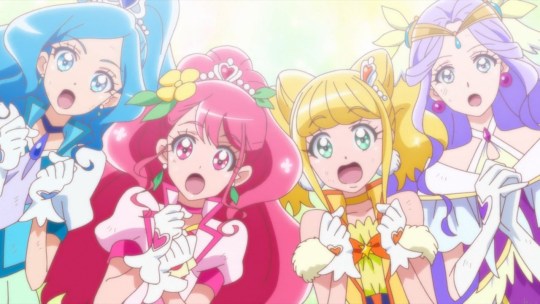
But to be honest, those weren't the only reasons why it took me a month to be back... I've actually been avoiding watching Precure. Well, I've been avoiding watching most of the things I write about because I've overdone it at the beginning of the year, and burn out hit me seriously, but from everything Healin' Good is what I've been avoiding the most. I know it doesn't seem like it, considering the last 3 posts I've made in the past 4 months (wow) were of Precure, but I've been watching the other shows here and there, I've just been sitting on a huge pile of drafts in my Evernote because I can't put my thoughts on those shows in a cohesive way for some reason, but when it comes to Precure, while it's easier for me to write about, I didn't feel compelled to get back and watch this show.
Every time I would sit down to watch a Precure episode at the same time I would open YouTube and Twitch in the hopes of something else I was more interested in would be there in my subscription box so I could avoid watching Healin' Good. And it's not like I think the show is utterly bad or isn't even like I don't have a good time when I actually sit down to watch the show, I just... lost interest. I think ever since Earth's debut my interest in the show has been decreasing more and more, and I don't know how to pinpoint if it's actually a problem with the show or if it's just me and the headspace I've been in ever since the pandemic hit Brazil. Yes, the story had plot points that I didn't like and the flaws of the show have been more apparent in my eyes with each time I watch it, but at the same time sitting down to watch one episode isn't an excruciating experience (especially when i'm not live-tweeting, istg i don't know why I ever thought that would be a good idea), I just don't feel attached to these characters as much as I did before and I'm not engaged in seeing what their story will become in the future.
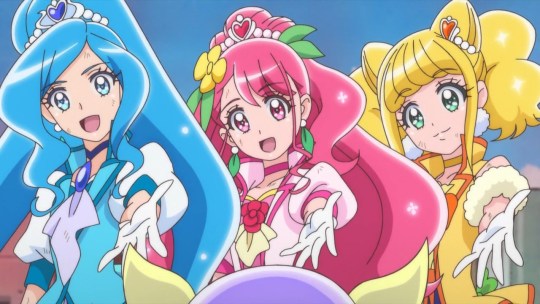
With that being said, I think you all are already prepared for a post that won't be very positive so I guess it's time to put my personal rambling aside and talk about what y'all came here for, episodes 31 to 35 of Healin' Good Precure.
When I left in the last post I know I've said the cliffhanger of Episode 30 was a good one, and well... Episode 31 used its boots to step on my fingers and made me fell from that cliff. I forgot that since we were ending in that action the next episode would begin with the Cures being defeated, the major portion of the episode would be for dealing with the tension, and the new power-up would come at the climax. And that was exactly what happened, except that there was no tension at all and the power-up didn't feel like a cathartic experience just a Deus Ex Machina. The episode was very anticlimactic and just very uninteresting as a whole and once again, I know I'm going to be very repetitive here, it all comes down to the villains.
Everything that is depending on the villains' side to make me feel something 9 times out of 10 won't make me feel anything because of how boring they are. They made such a big deal about the villains evolving after using the Mega Parts, but it feels like anything changed. Shindoine is still just "the girl", Guwaiaru is still just the dumb strong guy, and the so-called power we're supposed to see from these new forms don't really make much of a difference since these two never get into actual fights with the cures, only the MOTW do. Daruizen is the only one they make stuff with, but it's more because they're really desperate to make him and Nodoka to be deeply connected and so they'll mold his character and personality to forcefully match him with whatever Nodoka's problem will be in that episode, if they need him to be the bored one he'll be, if they need him to be the curious type running experiments he'll be that, if they want him to be a selfish lone wolf they'll make him be. And that's just boring, at this point this villainous team and a cardboard cut-out are basically the same thing.
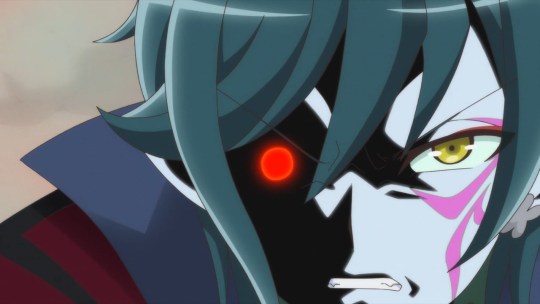
While also speaking about this "evolution" from the villains, you would think the new human-powered Giga Byogen would bring something new to the table, but no. It's just the exact same thing as before just with a bigger range for creating infections and a slightly higher defense stat. They aren't used in creative ways neither proposes a different treat that the other Mega Byogens did, proof of that is that in Episode 35 instead of a Giga they bring back a Mega just to show how irrelevant they are. They're also different from other monsters who draw their power from humans like a Nottrigger, or a Desertrian, or a Zetsuborg, where in most of the cases the summoning of the monster would be relevant for "solving the problem" afflicting either the victim of the week or the people around them. The teacher being affected didn't make his son appreciate the father more than he did before because that wasn't his conflict, Nodoka's doctor didn't have a revelation about his talents for medicine and Nodoka also didn't get anything new that she hadn't already learned before in the episode, neither did Chiyuu and her rival, you could completely delete the fight and that episode would've reached the same conclusion. Heck, the victim of episode 32 had only TWO appearances before he was turned into a monster, I doubt he was on screen for more than a minute, and they didn't need Touji to be there protecting the dog in the middle of the fight BECAUSE CHIYUU WAS ALREADY AWARE THAT HE'S A BRAVE HARD-WORKING KID BEFORE. These monsters are completely irrelevant and they don't add anything else to the show, and that's just really sad.
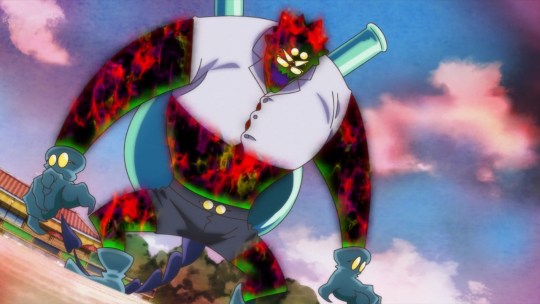
Back to Episode 31, let's talk about this power-up, shall we? Being straight to the point, I don't like it, both in the visual and narrative aspects. I visually like them even less now that we already know how the movie power-up looks and how much those forms are way more interesting than just a bigger hair and bigger skirts with a set of wings in the back that you could find in a Halloween costume sale. But who cares about how they look when this power, that is the manifestation of the the four cures combined powers together with their respective healing animals, comes out of nowhere without anything specific happening for them to trigger the appearance of the Healin' Good Arrow and the Special Healin' Good Bottle. Guess is needless to say that the Special Healin' Good Style doesn't feel special at all, it's like it only exists just to sell toys. Well, it's not like everything in this franchise is just to sell toys, but they usually know how to merge this with the story of the show and this didn't happen here. Also, for Christ's sake, this is the second year in a row where the name for the group powered-up attack is just the name of the series being used in the more boring way possible, where has their creativity gone to? The only good thing I have to say about this is that it gave us the healing animals doing some sort of rhythmic gymnastics and Pegitan twirling in that is prime content.
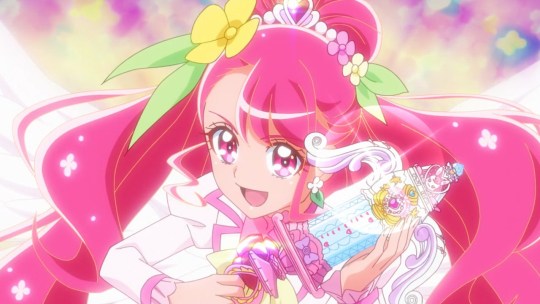
Overall complaints done, let's move one. (these will be quicker)
Episode 32, at first I thought I wouldn't like this one because they brought back this weird rivalry Pegitan has with Chiyuu's brother that doesn't have much of a reason for existing, but it was actually pretty sweet and heartwarming seeing Pegitan leave behind that and showing that he actually cares a lot about Touji, this silly rivalry is just his silly way of showing it (Showing it to who? I don't know, since no one but Pegitan and the audience seems to be aware of this, but shhh). This episode also made me like Touji, before he was just a background character to me and I didn't care much for him, but now I see him as more of a character of his own and not just Chiyuu's brother.
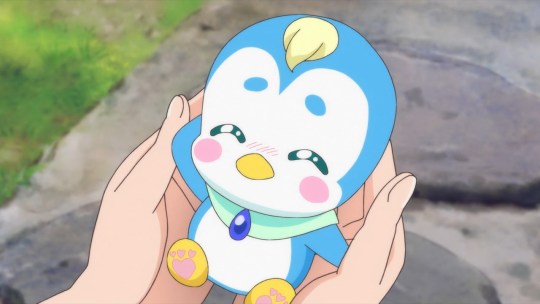
Episode 33 was my least favorite of the bunch because it connects to what to me is the worst plot point of the show: Nodoka's illness being a magic thing. If this had never been a thing, I'd be completely here for this episode. Nodoka's Doctor leaving his job because he felt powerless regarding Nodoka's disease and that being what drives him to go overseas to start doing medical research?? That seems great, and Nodoka feeling guilty for him leaving, while in actuality she's his inspiration is actually pretty emotional. But to me, it all just loses a lot of its importance because Nodoka was never sick after all, and unless this dude discovers on his own about the Byogens he pretty much went through all of this emotional trauma because and for nothing, it all becomes sad when you remember this aspect of it.
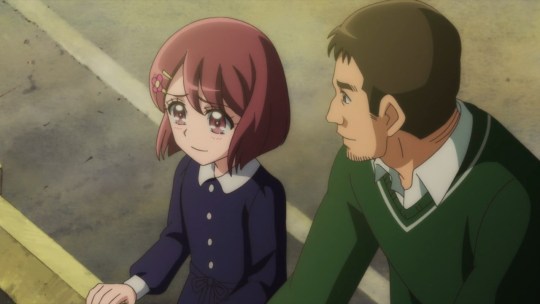
Episode 34 was going very well to me up until it's last moments where instead of sticking with a somewhat unique perspective on how to do a story like this they just throw it all through the window and instead of making Chiyuu and Tsubasa friendly rivalry exist outside the world of competitive sports they make Chiyuu change her mind and decide to pursue the World Tournament because you obviously can't have other interests and want to pursue different things when you're out of school, you gotta do that all your life, no other option allowed. This got me so disappointed, y'all have no idea.
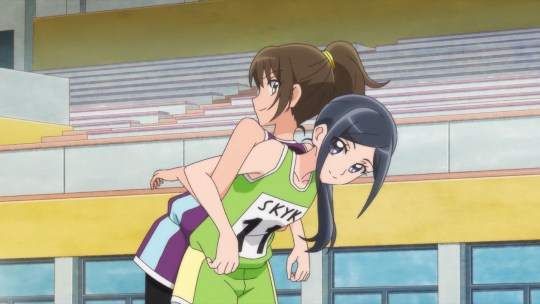
Last but not least, Episode 35 which was my favorite, probably because it felt completely disconnected from the rest of the show and I could freely enjoy it in a separate pocket dimension without thinking about the rest. But regardless this was just a very fun and over-the-top episode that wasn't concerned about anything else other than just being fun, and that was exactly what I've been needing. Also, volleyball and beach volley is just cool as heck and seeing that incorporated in the fight of the episode was just fun as hell and a good change of pace. Akane sure is proud.
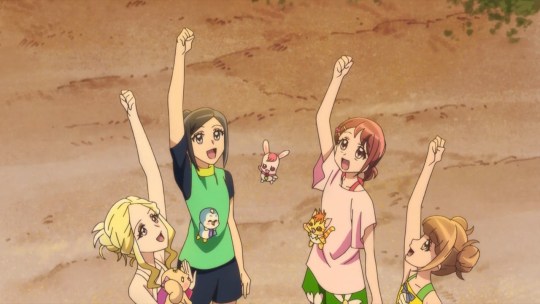
And that does it for now. Much like at the beginning, I also don't know how to close this one, especially after writing all those bad things and the fact that I'm not that excited for what's to come next. Well, let me know how you feel about all this, I don't know when I'll be back with another post but I promise I'll at least reply to any comment I receive. Without much else to say I'll leave you all with my usual sign-off. Stay healthy, stay safe, never stop resisting, thank you so much for reading, and until the next time. Healin' Goodbye~
3 notes
·
View notes
Text
Ranking : The Coen Brothers (1954/1957 - present)
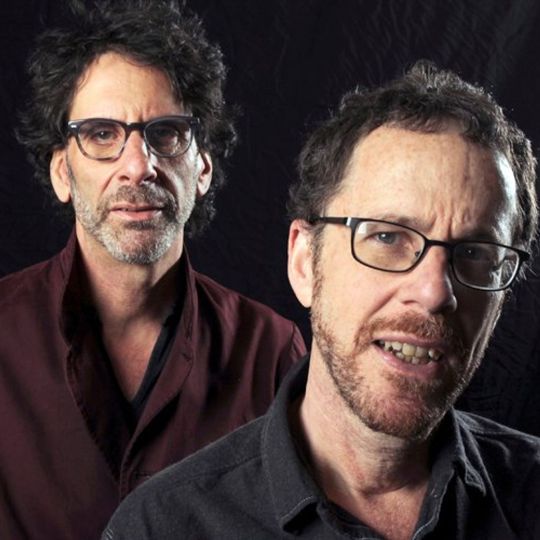
Directing a film can be one of the most vast, task oriented and stress inducing undertakings imaginable, which makes it odd that more directing duos, specifically sibling duos, do not exist. Sibling duos like the Wachowskis, Hughes, Farrellys, Safdies and even the Zellners have made names for themselves, but one set of siblings easily towers above the rest : the Coen brothers. With nearly 20 films under their belt, and nearly as many stylistic varieties and storytelling approaches found within, it is hard to argue the impression they have left on moviegoers worldwide over the past nearly four decades they’ve existed professionally. With such a stellar record of films under their collective belts, I’ve decided to do the most stress-inducing task of all : rank these films from least to most favorite.
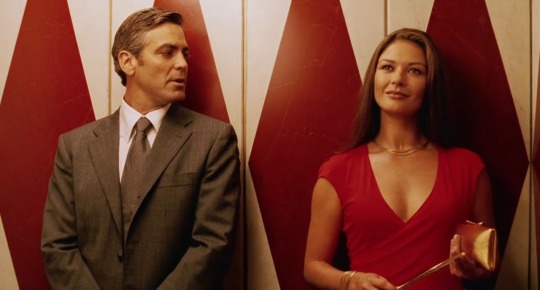
18. Intolerable Cruelty (2003) For a duo with so much distinct style and flair for storytelling, this film feels the least like a Coen Brothers film. If anything, this feels like a script that sat on a shelf in pre-development hell, possibly for years, only for someone considering themselves a bit of a ‘maverick’ or ‘forward thinker’ to discover it and think that a dose of Coen Brothers magic could save it. Even with the star power of George Clooney and Catherine Zeta-Jones behind it, this one feels a bit too ‘by the numbers’ to stand out from an oeuvre that nears perfection.
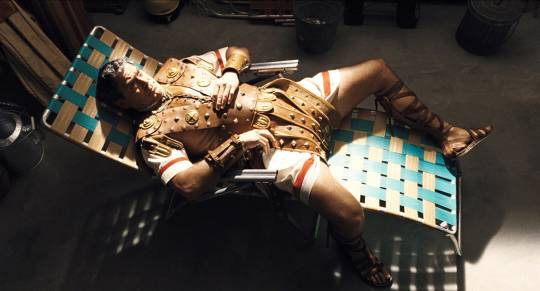
17. Hail, Caesar! (2016) I’ll be completely honest with you all... I don’t remember much about this film. I remember enjoying it, but I don’t remember being blown away by it. I remember enjoying the colorful display of old Hollywood, and it’s always refreshing to see George Clooney lean into roles that border upon slapstick. For as much as I found this film not all that memorable, however, it stands above Intolerable Cruelty simply because it does not trigger bad memories.
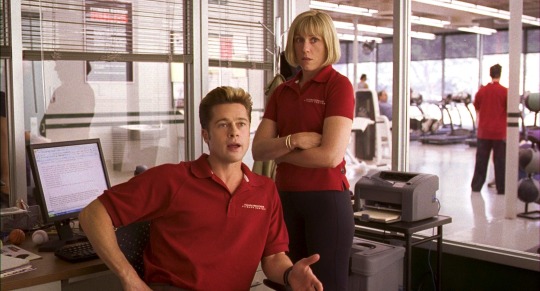
16. Burn After Reading (2008) This film is what Intolerable Cruelty wanted to be... a property that is a hair closer to by the books, but full of a screwball approach that heralds to a forgotten era of film while using an incredibly stacked cast. Of all the Coen Brothers films I’ve seen, Burn After Reading feels like the property that all involved enjoyed making the most. Like many of the Coen Brothers films, the cast on this one is mega-stacked, and from top to bottom, everyone involved shines in roles that go against their standard types, or amplify the most off-beat aspects of their performing ability.
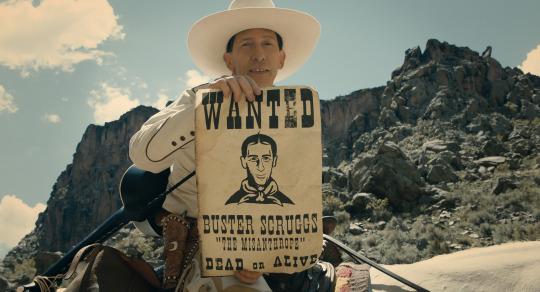
15. The Ballad of Buster Scruggs (2018) The fact that Netflix was able to pull the Coen Brothers for a film is a win in itself, and with the duo choosing to do an anthology piece, Netflix was primed to maximize on their investment. While highly entertaining, however, the anthology nature of the property leaves it feeling a bit unfocused and disjointed at times... none of these stories really had enough meat on the bone to be expanded into feature-length films of their own, but for some reason, all parties involved passed on the opportunity to make a multi-episode serial rather than a film comprised of multiple tales. While using variance in storytelling methods and visual styles may work for some less talented directors, in the case of The Ballad of Buster Scruggs, it feels more like snack-sized bites in the place of true sustenance.
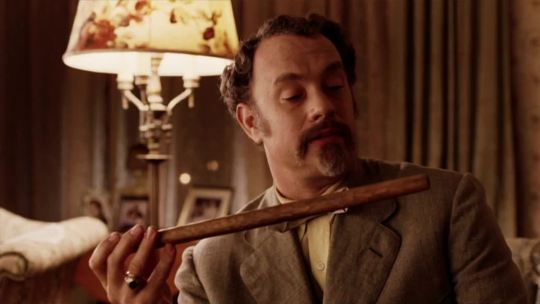
14. The Ladykillers (2004) On paper, this film should have been a disaster. The Coen Brothers generally opt for original stories, so the fact that they chose to adapt such an obscure 1950s property for the modern day was strange, especially in light of the fact that most every element with the exception of Tom Hanks’ character was given a modern update. Somehow, despite all of this oddness, The Ladykillers managed to capture a sense of the classic Coen Brothers slapstick comedy that they famously established themselves with early on in their career. Tom Hanks is given the green light to go completely ridiculous, and to much of the viewers’ delight, he does so with great aplomb. His supporting cast shines, the comedic turn brings new energy to the story, and the southern gospel setting brings a rich sense of spirituality to an otherwise run of the mill film.
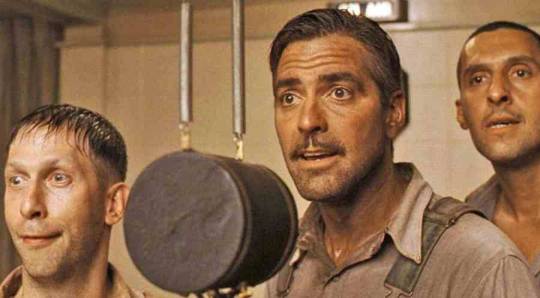
13. O Brother, Where Art Thou? (2000) The Coen Brothers were essentially household names by the turn of the 20th century, but O Brother, Where Art Thou? propelled them into a legendary status. The grassroots mix of The Odyssey and the Robert Johnson crossroads legend took on a life of its own, leaving behind a soundtrack that birthed an entire generation of folk and bluegrass enthusiasts, as well as a film that showed the world George Clooney’s comedic chops. Much like The Ladykillers, O Brother puts viewers deep into the unfamiliar territory of Southern ‘discomfort’, with the African-American experience playing a major role in the narrative. Of all the Coen Brothers films one could use to introduce a stranger to their catalog, this one may be the best, as its infectious nature and stunning look leaves an impression on most anyone who has the pleasure to view it.
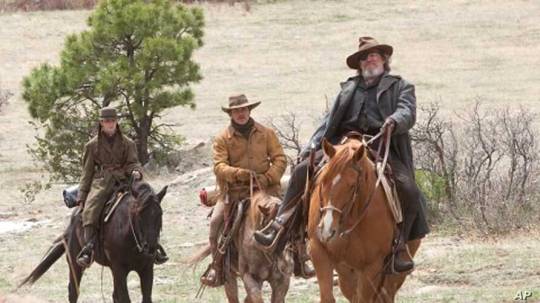
12. True Grit (2010) The Coen Brothers had already covered a wide bit of genre ground within their first three decades, but surprisingly, they’d not done a true western up to that point (though many argue that No Country For Old Men is a modern take on the western). Therefore, when it was announced that their first western would be a remake of the iconic John Wayne film True Grit, many were surprised, and curious if they could pull it off. Not only did they pull it off, but in my humble opinion, they made a version that more than holds its own against the original. For the handful of big name and seasoned actors that signed on, it was the breakthrough performance of relative newcomer Hailee Steinfeld that outshined all. While The Ballad of Buster Scruggs was a fun revisit to the world of the western, True Grit was the kind of achievement that makes me want more traditional westerns from the duo.
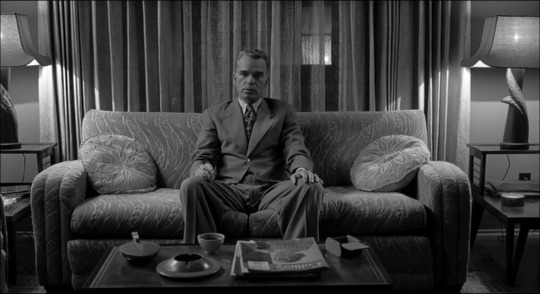
11. The Man Who Wasn’t There (2001) Listing the Coen Brothers films is by far the most difficult ranking I’ve done to date, and the first film that really gave me trouble in terms of placement was The Man Who Wasn’t There. Personally, I find this film to be captivating and nearly flawless... Billy Bob Thornton’s detachment is rich and intrusive, which makes it all the more sinister when he does choose to exude even a hint of passion about something, be it positive or negative. The black and white photography, in league with the tone of the film, puts me in the mindset of films like In Cold Blood, and some of the sequences in the film stand out as some of the most iconic in the world of Coen Brothers films, especially the car crash. For a classic-style film noir, a genre that anyone with half a brain knew was a slam dunk for the Coens, the duo went above and beyond to both modernize and wholly embody the style. One of several Coen Brothers films that sits with you long after the final credits have faded away.
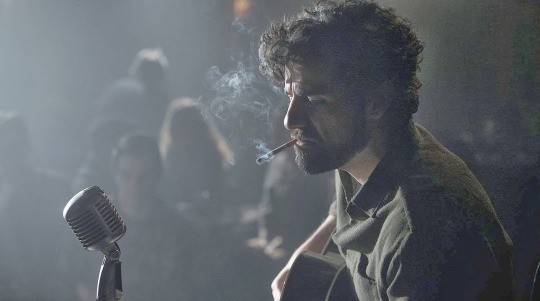
10. Inside Llewyn Davis (2013) If this isn’t the darkest comedy in the Coen collection, it’s certainly giving the number one contender a run for its money. The intimacy of this film is unmatched within the broader collection of Coen characters, excluding The Dude, but the difference between Llewyn and The Dude is the personality equivalent of the difference between oil and water. You may marvel at Llewyn’s talent, but all the while, the film is screaming at you that “THIS IS A CHARACTER YOU SHOULD NOT ROOT FOR”. The symbolism found in the film is minimal while being incredibly effective in how it punctuates Llewyn’s personality and character, and the story structure is an equally subtle swerve that baits you into paying deeper attention, only to realize that the setup was the punchline the entire time.
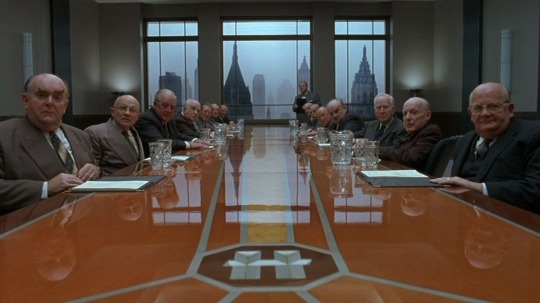
9. The Hudsucker Proxy (1994) I’m a sucker for a Coen Brothers comedy, especially the ones that play like human cartoons, and one of their absolute best was The Hudsucker Proxy. The writing on this film is so tight that it would absolutely pop if it were any tighter. The entire A Christmas Carol-esque approach to the story makes it a wonderful moralistic tale that makes people laugh so much that they often don’t realize they are being taught a lesson about morals, integrity and self-respect. Tons of familiar character actors fill the frames, everyone tasked with supporting roles fit firmly and comfortably into the created world, and the man trio of Tim Robbins, Jennifer Jason Leigh and Paul Newman are functioning on genius levels of performance... especially Jennifer Jason Leigh. While not quite a holiday movie, there is enough of a holiday sense that it could be shoehorned into a seasonal viewing, but any time set aside for this gem is the right time to watch it.
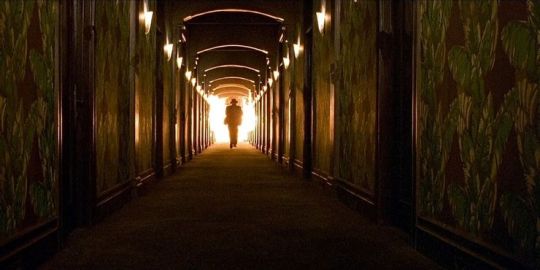
8. Barton Fink (1991) In my humble opinion, this may be the strongest end to end performance from John Turturro in his long and storied career. As clear-cut fans of film, it is always a pleasure to see the Coen Brothers explore the world of film, and by using this approach, they are able to tell a bold, brash and haunting tale about the issues that come with assumptions about character and talent. The takes on Hollywood and the indifference of those in power, especially when it comes to assisting young and promising talents that may one day usurp them, and powerful. The real bow on the story, however, is the larger than life presence of John Goodman, who goes from being a slightly aggressive and overbearing sense of support to a literal madman by both name and action. For a film that mainly consists of individuals talking to one another about passion, talent and secrets, there is a kinetic energy that feeds the forward momentum of this movie, and for that, it stands out in the Coen collection.
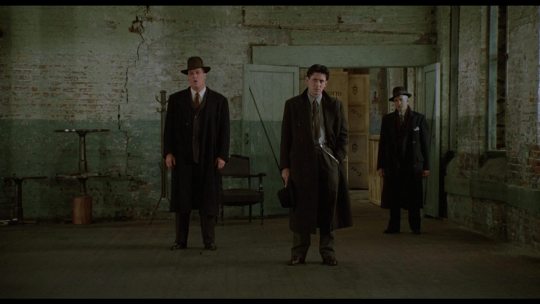
7. Miller’s Crossing (1990) It’s not surprising that the Coen Brothers could make a compelling and memorable gangster film, but I don’t think that anyone expected a film as vicious and dark as Miller’s Crossing. For a duo that generally relies on nuance and contemplation to get their points across, this film certainly proves that they are more than capable of excelling in the direct approach as well. The era-specific costuming is outstanding, the murky city areas stand in stark contrast to the woods of the titular Miller’s Crossing, and the sheer volume of bullets are a stark reminder of the Prohibition-era story we are viewing. Gabriel Byrne shines in his lead role, bringing a world of fury, deceit and mistrust in tow with him. The iconic hat blowing in the wind serves as not only the biggest memorable moment from the film, but possibly also the single moment of peace and beauty found in a film that holds up a dirty mirror to a dark world.
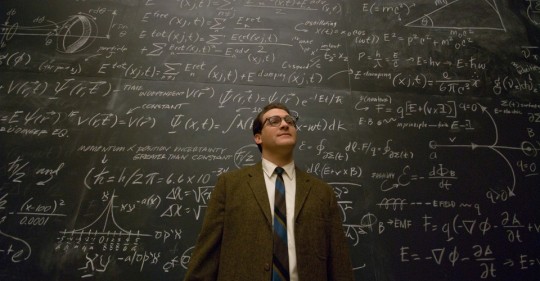
6. A Serious Man (2009) Of all Coen Brothers films, this is easily the most underappreciated and slept on of the bunch. I’m a sucker for movies that embrace Murphy’s Law, and when mixed with the parable nature of the Book of Job, we are presented with a darkly comic and relatively unique version of the hero’s journey. The way that the personal, professional and philosophical problems pile up on Michael Stuhlbarg’s Larry are meant to be felt by the audience, and the way that his bad luck boomerangs out into the world during the film’s resolution must be seen in order to be believed. The way that destiny and chance dance around one another in this film is narratively breathtaking, and for such a subtle film, it is a truly remarkable achievement.
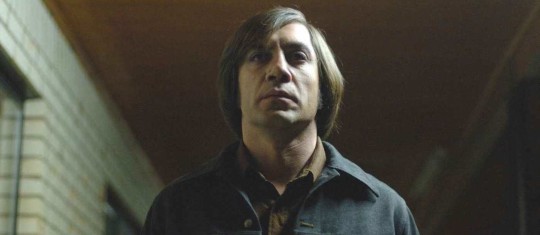
5. No Country For Old Men (2007) When you think of the Coen Brothers, you don’t necessarily think of evil incarnate, and yet, the duo succeeded in capturing a character in the form of Anton Chigurh, the closest thing to the Terminator that the duo has ever created (to my knowledge). The story is a wonderful, subtle tale of how the times can change into something we don’t recognize before we recognize the change, but it is easily Javier Bardem’s iconic performance that gives this film all of its power and ominous energy. His unyielding forward momentum, his disdain for obstacles in any form, and his disregard for human life are enough to instill real fear into those who partake in viewings, and his presence will more than likely haunt you far beyond completion of the film. A true modern-day masterpiece that would have been higher, if not for...

4. Blood Simple (1984) What a powerful debut, and one that not only hinted at, but outright put the spotlight on the promise of the Coen Brothers when it came to stark visuals and stunning storytelling. For such a simple, small scale story, the tangled web that is woven is a slippery slope of deception and distrust that leaves little to no survivors in its wake. The scale of the film is deceptively small, but the quality shines in every aspect that it can. Seeds are placed that pay off wonderfully, and the color palette presented gives the film the feeling of a Technicolor film-noir. Much like A Serious Man, Blood Simple deserves to be talked about and held up much more than it is by fans of film.
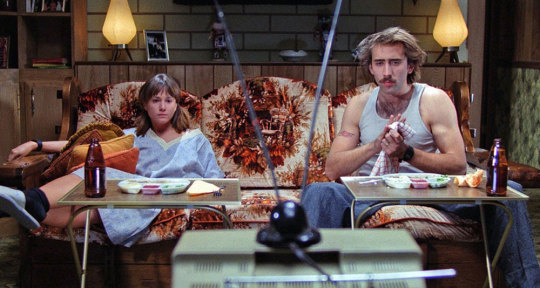
3. Raising Arizona (1987) What a wonderfully ridiculous movie about something as simple as the trials and tribulations of navigating love, marriage and parenthood. The most hilarious aspect of this film, in my opinion, is how it feels like a living and breathing cartoon, both in terms of the character performances and the outrageous events that take place within the world of the film. Nicolas Cage is operating on a completely different level, Holly Hunter is equal parts charming and hilarious, Trey Wilson is wonderfully over the top, John Goodman and William Forsythe bring excess hilarity to the wild proceedings, and Randall “Tex” Cobb is downright iconic in terms of his ridiculous character. The pacing of the film is breakneck and feverish, the comedy hits never stop coming, and the utter charm emanating from the midst of the caper presented is infectious. As a second film, this could not be any more different than Blood Simple, and yet somehow, it connected so vividly with viewers that it remains a must-watch film to this day.
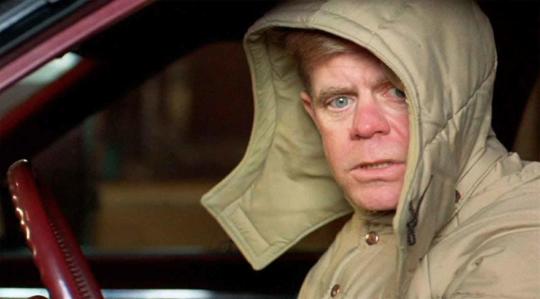
2. Fargo (1996) What is there to be said about Fargo that has not already been said? For a duo with more iconic films to their name than some directors have completed films, Fargo was an immediate signal that the limits of the Coen Brothers’ creativity and skill had not even began to show its full breadth. Within less than five years of release, the film was already heralded as a classic (of all-time, not just modern day), the mystery surrounding its possibility of being based on a true story built a world of intrigue around the movie, and it has gone on to create a universe of its own in the form of an FX TV show that recently wrapped its fourth season. There is not a wasted role in this film, and to this day, any movie fan worth their salt will happily bust out their version of a Minnesota accent that is almost certainly based on one of the many memorable characters that inhabit the world of Fargo. Numerous actors, including William H. Macy, Frances McDormand and Steve Buscemi, all found breakout success in the wake of this wonderful film.
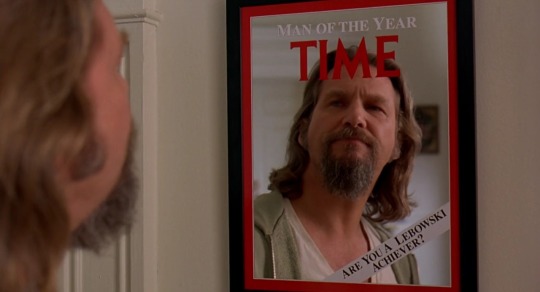
1. The Big Lebowski (1998) Was there ever any doubt for this placement? For everything that Fargo did in terms of success within the world of the film industry, The Big Lebowski did that and more for the worlds of the counter-culture and cult film fans. The story we are presented with is so simple, yet so ridiculous in its journey, that it almost insists on viewers revisiting it over and over. Like many Coen Brothers films, nobody cast in the film is wasted or misused, and due to these stellar performances, the film finds itself as one of the most quotable in recent memory. Much like the performances of the cast, the writing does not waste any words or opportunities, often referring back to itself in extremely subtle and nuanced ways that present themselves over time, and to hilarious effect. Nobody would have expected a film of this nature to have a fandom, and yet, the legions of fans for this film are unique to that of the Coen Brothers catalog in the sense of their dedication, devotion to and love of the movie. While not everyone’s cup of tea upon first viewing, The Big Lebowski is truly an example of the gift that keeps on giving.
If the Coen Brothers never make another film, they’ve already created and achieved more in their journey that most filmmakers can dream of. Many of their films could honestly be considered works of art, and nearly all of them are compelling with an ability to leave deep and lasting impressions. If you are unfamiliar with the Coen Brothers, do yourself a favor and check out their work, as it may bring a new sense of invigoration to your love of film.
Editor’s Note (12/10/2020) : Inside Llewyn Davis added to the number 10 position, all films ranked lower adjusted accordingly.
#ChiefDoomsday#DOOMonFILM#JoelCoen#EthanCoen#CoenBrothers#BloodSimple#RaisingArizona#MillersCrossing#BartonFink#TheHudsuckerProxy#Fargo#TheBigLebowski#OBrotherWhereArtThou#TheManWhoWasntThere#IntolerableCruelty#TheLadykillers#NoCountryForOldMen#BurnAfterReading#ASeriousMan#TrueGrit#InsideLlewynDavis#HailCaesar#TheBalladOfBusterScruggs
4 notes
·
View notes
Link
i usually don’t post about my own work because i never think much of it. Even now i feel conflicted about sharing this because i have my own personal and intrusive feelings involving this story. But part of me feels like it should still be shared on some level because it’s not just about working as a cashier, but working as a cashier in the middle of a pandemic. Even though the characters are fictional, the retail stories they go through are very real, directly taken from the ones i have experienced as a cashier. If anyone else does read this, if there’s remotely anyone can possibly take away from this story at any point at all with it, it’s to just please think. Think before you snap at a retail worker. Think before you cause a scene. Think before you do something, like leaving a yogurt by the potato chips. Think before you complain or ask about every little thing. We see and deal with a lot of crap on the job all while dealing with our own crap. It’s hard and sometimes it can be downright abusive. But we try. We do our jobs. And it’s a lot. So please try with us, too. [More under the cut, but it’s primarily personal and also A LOT.]
Frozen 2 has absolutely been the thing helping me through this pandemic. When my store closed early for limited hours i’d be playing the soundtrack on Spotify. Before eventually falling asleep after shifts ending at midnight i’d always listen to a Frozen song on my iPod because after crazy shifts, crazier than usual retail stories, and a hell of a lot of food to either put back on the shelves or discard completely, Frozen helped put me in a slightly better mood before falling asleep. In a time of so much confusion and fear and uncertainty, it’s difficult to find the positivity in everything. Even though i do try to go into work and leave my problems at the door, the Frozen franchise was definitely a light for me. It helped to imagine some of the characters - even other Disney characters like i included in the story - go through similar things i was and wonder how they would handle everything. It started with just a thought: would Elsa sing if she was working this job, too? Would anyone actually hear her? And cue the slow burn between Elsa and Honeymaren. But it’s more than just that.
i am so fortunate to have a great relationship with a lot of my coworkers. We get along; we ask each other how we’re doing; we make conversation when it’s slow; we talk about our lives. It helped me to just be able to go through this with these people. It helped that, yeah i was still getting out even during quarantine and seeing these same people WAY more than usual (and it was already a lot!), but for us to just all have this understanding of each other and for us to be able to support each other. And that was something i wanted to focus on here. A positive working relationship between Elsa, Maren, Nani, Snow (White), and (Cinder)Ella. These very different people being thrown together a hell of a lot more than usual and spending more time together and in their store than with their own families in their own homes. Yeah, they can get on each others’ nerves sometimes. They can drive each other crazy. But they’re ultimately there for and support each other. And i know every job, retail or not, can’t be like that. But sometimes we do spend so much time at work that it not only becomes home but the people we work with become a family. (Although a very dysfunctional one!) That’s something that’s been essential to me as an essential worker and a small piece of the inspiration behind the story.
To have been writing this throughout the pandemic, drawing from my own experiences and stories as a cashier, seeing peoples’ reactions and to have been given the encouragement and support by them has just been mind blowing. i say that i started this as a joke, because i deal with so many unbelievable stories on a daily basis at work that i should really write a retail story. And...this is it. For people to have told me that this helped them with something in the store (chip malfunctions at the pin pad, anyone?) or to see how horrible some customers can actually be, to just read peoples’ reactions at the cruelty of others, while others to their customer service jobs of the past and bringing back memories for them? i did not expect the support, comfort, or acceptance that i received from this. And i did not expect people to just so readily accept the story as a legit Frozen fanfiction.
What blew my mind even more, in the best possible way, was the reaction to how i wrote Elsa. [Minor spoiler here, but not really because it is a tag.] i know this is not the first story to write her as asexual. i know it won’t be the last. And how many of us read Elsa as a queer icon in general? Writing Elsa’s coming out scene to one of her coworkers as an asexual lesbian was directly inspired by an instance where i came out as asexual to one of my coworkers. It was one of the first chapters i wrote long before i knew anything about this story; where it was going to go; how exactly i would write it; or anything that would happen. i just knew that if i was going to write a retail story, that specific story had to be a part of it. To read the reactions of other a-specs reading this and see how seen and represented and validated they feel, to know that while Elsa’s journey may not exactly be theirs nor is it my own there’s still so much relatability, to have the reminder that as many times as i feel like i’m the only ace person i know (even though that was not totally true and it’s absolutely not true now) there are other people out there and that a lot of the things i touched on in the narrative hit so close to home for them.... It’s just been an honor. And that’s something that, when i question what the hell i’m doing or my capabilities as a writer/creative person, i try to think about that. And remind myself that this was something i was able to do and it means so much to the a-specs who read it. And it was something that made me feel apart of something really special; not just the queer community, but also the Frozen fandom.
i have a lot of conflicted feelings with finally finishing this story. And i think a lot of them are because as i finished writing this while also going through multiple edits and rewrites, i was dealing with things in my personal life that took my head out of the story. And while dealing with the craziness at work as usual around Thanksgiving that was only heightened by the still-confusion and uncertainty of the pandemic, though it should have given me so much more material to one day work with, it really just drained me. And part of me still doesn’t feel like i even wrote something worthwhile, let alone something good. i deal with self-confidence issues and intrusive thoughts along with semi-newly-discovered anxiety; and those have no doubt played a part in my own comments on the story as well as some extra self-projection (as if there wasn’t enough of that between the job, the customer stories, and the chocolate addiction but that’s besides the point). But i’m still trying to remind myself of the good that has come from this story. And i want the good of what everyone else has seen in this to far overpower whatever i think about it. As much as a major takeaway i’d like for the story to be to have a better understanding of retail workers, what we’re going through at work and potentially in our lives, and to just think, there are two other things i’d like to stay with people. •In regards to, yes, primarily a-specs, but also to the queer community in general, there is nothing wrong with you. You’re not broken. It takes a lot of time, patience, and understanding to accept yourself. And that’s ok. You will find the label(s) and meanings that work for you. Everyone relates to their orientation differently; but there’s no wrong way. Sometimes it’s hella hard to accept that part of you, regardless of what it is. Unfortunately, yes, there will be people that don’t believe you. But there are also people around you who will accept and love you exactly for who you are. They do it with Elsa in this story; people in real life can do it, too. It just takes a while to find them. You mean something to people and you are absolutely worth it. •One of the best things about creating anything is to take people away. To distract them from the real world for a while. To make them forget about their problems. To make them feel something. To see things through another’s eyes. To experience something. To give them something to enjoy. For all the craziness that i may call my story, it’s still something that’s brought people so much joy. To give them that happiness, to make them feel, to take them away to another world (even if it’s just a fictional modern AU with a couple of useless lesbians/bis/queers). That’s what i want this story to do. That’s what, selfishly, i’d want anything i could ever create to do. No matter what i think, it’s the people who enjoy it that matter. And they are absolutely the motivation behind all of this.
This story has been my outlet through this entire mess of the world. It’s been my outlet, a soapboax, and an escape. Because seeing Frozen 2 just before the pandemic hit, becoming so lost in it, loving so much about the story and the characters and the world, gave me more inspiration to be creative when it’s something i’ve personally struggled on and off with for the past five years. Being immersed in the world of the Frozen franchise is the closest i’ve felt to being happy in years. And i’m so thankful to Disney and the creators of Frozen, Jennifer Lee and Chris Buck, for giving us so much to work with. From the world itself to the relatable characters in Elsa and Anna to the friendships they created to just the pure inspiration that comes from them. And how they can make so many people from so far away feel so close together. And i’m more than grateful to everyone who’s read this story from the beginning, who saw something in it - who saw something in me - and have been the motivation to keep going with it. It’s been absolutely incredible to write for everyone and i hope i get to write more. Please consider this my way of saying thank you to everyone and know how much all of this has meant to me. And thank you so, so much for reading.
1 note
·
View note
Note
What do you think about Samwena now? Do you think they can still be endgame?
¯\_(ツ)_/¯
The TNT loop has brought me up through 12.21 today, and it’s wild what new canon can do to recontextualize the past.
I’m putting this under a cut, so that saileen shippers won’t have to subject themselves to my rambling about Eileen and Sam in a way I know they’ll dislike... but I’m tired of feeling like I can’t talk about canon how I see it on my own blog.
Back when these episodes originally aired, with the week to week meta cycle in between, a lot of context was left up to us and never explicitly clarified in canon. Many of us were just thrilled at the notion that Sam had made one (1) friend that he seemed as close with as Dean did, if not closer. We were all ready to read way more into their interactions than was actually there, because Sam just gets so few of these sorts of personal relationships, at all, with anyone.
Things have been provided with clarification now in s15-- like the previous nature of Sam’s relationship with Eileen, and Sam’s repeated insistence to Dean’s teasing that they’re “not like that.” Which seems to be urging me to go back and reexamine everything from the past connected to her without the erroneous assumption that they already had a romantic relationship going offscreen. And let me tell you, that puts an entirely different spin on Eileen’s prior purpose in the narrative. As a parallel for Mary. Which is why I suppose I’ve been finding so many weird Mary parallels for her since her resurrection (starting with the fact that the spell that brought her back was designed to resurrect Mary instead and going right on through all the BMoL Free Will Erasure brainwashing plot literally in the episode where Eileen was murdered by Hellhound).
Lady Bevell: Well, not about this illusion of you that you hold on to. The perfect life. Loving husband and kids. But it never really was perfect, was it? All those secrets you kept from your beloved John – that you were a hunter. That you invited Azazel to visit when he spared John's life.Mary: How do you-Lady Bevell: I have sources, Mary. Everywhere. After you died, your beloved John was a man slowly going mad, searching for revenge. What? Your boys didn't tell you? The drunken rages? The weeks of abandonment? Child abuse, really. It's no wonder they're... damaged. So... enough with the fairy tale. We are returning you to a more pure version of yourself – Mary Campbell, natural born killer.
The “illusion” of the perfect life, the illusion of Free Will, in essence (especially now that we know Chuck was also behind the whole BMoL narrative). Not to mention that in this episode, Toni will later heavily imply that Mary was in fact the one who killed Eileen (even if it wasn’t true... Sam and Dean STILL don’t know who actually killed Eileen). I mean, the fact they found Mary in the process of attempting to murder Jody Mills probably sealed the belief that at the very least, it COULD’VE been Mary who’d done the deed. Even Mary wouldn’t know for sure if she had, because brainwashed:
SAM: Why you spying on us? Oh, and what do you know about Eileen Leahy?TONI: Who?DEAN: Did you – did – did your people, did they kill her?TONI: Probably. Rule of thumb – if you think we killed someone, then we probably did. Speaking of, you do realize that by attacking me, you invite the retribution of the entire British Men of Letters? Investigation, no trial. Just punishment and ruin. Possibly at the hands of Mary Winchester.DEAN: The hell is that supposed to mean?TONI: Your mother – she's our permanent guest.SAM: She's your prisoner? Why?TONI: Prisoner? Who said anything about prisoner? No, Mary's joined the team. Even has her own super secret decoder ring.SAM: You're lying.TONI: You're right. There is no ring. Oh, boys and their mums. See, you see her as Mummy. We see her as one of our best killers.
Sam’s main drive during s12 was doing whatever he could to desperately create any sort of relationship with Mary that he could (even willingly working with people who’d TORTURED him), and this is what haunted him into s13, as well, after destroying the BMoL to save Mary, and then almost immediately losing her again to the AU.
Do I think that Sam is considering the possibility of a real relationship with Eileen? Probably, yeah, after Dean’s prodding, especially. But Dean was fundamentally misunderstanding the nature of Sam’s “agreement” with Eileen there. It wasn’t about a romantic arrangement.
Because they aren’t like that.
Eileen propositioned Sam in 15.07 (in the name of doing something “fun”), yes, but I still can’t see Sam’s reaction there as anything but surprise and consternation. He seems almost relieved that Cas showed up when he did to interrupt what would otherwise have been an uncomfortable and probably embarrassing talk.
When Dean asked about Eileen in 15.08, it felt to me like Sam’s comment about them having an agreement was directly about the opening scene... where Sam had secretly followed her out on a hunt, and then nearly getting himself killed both by Eileen AND the vampire, all because he didn’t trust her to handle it or ask for help if she needed it.
Their agreement gets further contextualization via Sue’s comment to Eileen, taunting her about having to “get permission” to come out and help her on a hunt. Because that’s exactly what she had to do. That was the nature of her agreement with Sam-- that she wouldn’t just leave without at least leaving a note (Sam’s exact words to her in that opening scene... “You could’ve left a note.”)
DEAN: Yeah. Eileen did good, right? Getting us back from hell. She doing okay?SAM: Yeah. I guess.DEAN: You guess?SAM: If she needs something from me, she'll tell me. We have an agreement.
It felt like Sam was telling Dean that he didn’t know how Eileen was, because part of their agreement was that Sam... not pester her over this sort of thing. Sam seemed... disappointed over the whole situation. Dean immediately turned this into a relationship thing, though, leaving Sam slightly confused, but probably considering the option, at least.
DEAN: You have an agreement? That's adorable. Look, man, I didn't want to say anything, okay, 'cause I was kind of in... in a bad place, and, uh, yeah, I didn't want to jinx it or whatever, but, you know, I tried the family thing, right?SAM: Yeah, me too. And that's not for us.DEAN: No, not really. But I'm just saying if it was to work, Eileen, you know, she gets it. She gets us. She gets the life. She's hot.SAM: Dean. I mean, I'm not even...DEAN: Look, all I'm saying is you... you could do worse, okay? And she could certainly do better. Like, so much better. I'm happy for you, Sammy.
If only Dean hadn’t framed it as essentially “settling” for someone just because they conveniently ticked off the most basic “someone in the life” box.
And if only this hadn’t come two scenes after Sam found Rowena, dead, in Hell. And literally flinching at the change that he saw in her. Almost as if Dean was trying to give Sam the “it’s not so bad. You couldn’t save Rowena, but at least you have a backup romantic interest, since you can’t resurrect Rowena and make everything okay with her, because you already used Rowena’s own spell to resurrect Eileen...” It felt like a weirdly hearty consolation speech in that context.
And if this hadn’t felt like more of a comment on DEAN’S recent mental turnaround after his experiences in 15.07, and his tentative hope that things between him and Cas aren’t completely kaput, that Cas hadn’t completely written him off, after Rowena’s little Marriage Counselling session with them (again, two scenes earlier).
Now is this to say that Sam’s emotional investment in a relationship with Eileen can’t change going forward? Absolutely not! He might really, truly invest himself in a relationship with her!
I’m extremely interested to see what happens in 15.09, because I think that episode will hopefully give us so many of the answers we’ve been waiting for. Not necessarily about endgame love interests, but about Chuck’s involvement in the first half of the season’s unfolding drama. And I think Rowena will have a continuing part to play after that point.
Does that mean I think Sam’s emotional investment in a potential relationship with Rowena can’t be rekindled? We’ll have to wait and see, but as it stood after 15.08, Sam, at least, seemed to be shaken by the change that had come over her after her sacrifice.
SAM: Rowena, I...ROWENA: Samuel, please. You killing me was one of the best things that ever happened. Yes, there are things I miss about being alive. Flesh-on-flesh sex. Amazon doesn't deliver here... yet. But, lads, I'm queen. My subjects revere me. Well, fear me, which is better. I should have died a long time ago. Samuel, be a dear.SAM: Yeah.
This has to be like a knife to him, you know? He’d been so invested in her redemption, as the Fated Agent of her final demise. And for Sam, who knows what she feared and who she loved (but Sam doesn’t know he’s on that list, she told him flat out he wasn’t right before she told him to kill her), she represents his current biggest failure, you know? He capitulated to Destiny, because he had no other choice. And that is still the worst thing anyone on the show can possibly say.
THIS was the final straw that drove Dean to anger with Cas, too. Rowena’s death was the direct result of Cas’s choice to kill Belphegor rather than let him complete his spell. It’s all interconnected, and it’s all painful, and it’s all a direct result of Chuck’s breaking the story the way he did in 14.20.
So make of this what you will, but I’m tired of not talking about these far bigger themes to avoid upsetting shippers who want saileen to be endgame. We’re not there yet, and until we are, I want to talk about all of this in a nonjudgmental way, because I think it’s all interesting, not because I have some shipping agenda.
I know I have more to say about all of this, but this is a good start, at least.
#spn 12.21#spiders georg of the tnt loop#s15 meta rewatch#spn 15.08#spn 15.07#spn 15.06#spn 15.03#spn 14.20#spn 12.22#spn 12.23#samwitch#i'm not tagging the other ship because heck i'm not here to pee on daisies of happy shippers#even if this post is more 'a critical look at canon characterization' than anything about shipping#i honestly don't know how the series will end or who sam will end up with if anyone#so this isn't ship negativity at all... just laying out what i'm seeing with the benefit of hindsight#don't like don't read and all that#and lol in 12.17 eileen delivers all her most emotional lines to DEAN and then sam gets the hug because he's standing closer i mean...#i have removed my fanon shipping goggles and seen this all very differently...#Anonymous
40 notes
·
View notes
Text
Review Response, July 5-11, 2020
Another week!
Destiny #022
1) You know this entire time, I hadn’t cried once, because I’m not really much of a crier, but goddamn that hurt. I very nearly cried at Y’s death... that’s just brutal. I was so happy too, that they’d finally found each other. But I knew something was wrong from the time it said that he couldn’t hear her. A dexholder on high alert would definitely have heard that call. Anyways, perhaps if she’d’ve died knowing that he loved her, it wouldn’t have been so bad. But of course, that is not what happened. I imagine that the next thing that will happen is X will either somehow find the dexholders (whether they find him or he finds them idk) confess and become more of a recluse than ever with much pity from the others and then when they fight Peter again, X will turn against them and yada yada, or Peter will take him now and do whatever. Pretty vague, but that’s the current grip I have on the situation. Seeing as how Diamond almost killed Platinum in the same manner, one can assume that he was also aware of him killing Platinum. At least before you had the reassurance (although it’s not much) that Diamond wouldn’t be conscious of his doing, but he probably is. At least we were spared of the narrative. How ironic, Diamond doing the exact thing he wasn’t meant to do for Platinum. He was supposed to protect her with his life, instead he took away her life. This Zygarde really knows how to make a good tragedy, huh. Makes you wonder what he does in his free time. But despite her dying, Y was really proficient this chapter. Like, the fight with Diamond had you thinking, “Go girl! Kick his butt!” Because itself was the most fun (?) to read so far, for some reason. However short it was, it was very creative and for once Y was on top of her game and practically saved the day. But you and I both know that didn’t lasts very long. Oh well, at least we got to see Yellow.
Oho, didn’t cry, eh? Hehe. Maybe you should read SA after this. Given your pairing preferences, I think that one would hit you a lot harder. I’m fairly sure that Y’s fate in this chapter didn’t get as much of a reaction because the Generation VI cast was still fairly new at the time.
Well, the mind control victims should be vaguely aware of what’s happening from time to time, when the control slips a bit. Hehe. What Zygarde is doing in its free time... Um... is Zygarde the one writing the story? Hehe. I will say. While in recent couple of years, I’ve been happy overall and always will be, but back when Destiny plans were created... those were dark times.
Hehe. Y’s really awesome in fighting situations, eh? I suppose more of that is to come in Legacy. But in Destiny... well... cut short. ... Oh yeah, Yellow exists too. Hehe.
-----------------------------------------------------------------------------------------------------------
Destiny #023
1) Whoa. Just... whoa. I had no Idea that Yveltal could bring people back from the dead. Should I be fearing a zombie apocalypse? Ok haha enough jokes. I admit, I feel a sliver of hope. If Y’s was resurrected, could she live the rest of her life happily? But somehow I don’t think that will happen. I don’t know how Yveltal’s powers work, but if Yveltal goes down, wouldn’t Y also? And she’s under Yveltal’s control anyways, once she finds out about what she’s going to do I don’t think she’ll ever forgive herself. And of course, those who die cannot live life with the living again. It is how the world works and it is what’s right. But I don’t know how Y’s morals work, so it’s possible she may take the “try my best to live now that I’ve been given a chance” approach. Well, it’s a little too early to speculate now. I’m sure I’ll know more in the next chapters anyway. But something I do know now? Blue’s back! I did not think it’d be this soon honestly. I thought it’d take her a little longer. That makes me a little proud now. It seems like she’s willing to make up with Green. Ahhhhh what a relief. I’m confident that she’ll be a great asset to the rapidly diminishing team. That’s a bit of a depressing note. How many dexholders have been brainwashed now? Ruby, Sapphire it seems, Diamond, X (though it seems like maybe he can fight back a little?), and technically Blue (but Blue really can fight back). That’s a lot... and there’s no doubt that more will be brainwashed. How will the final battle look like? Will the other dexholders be able to break the hold on their minds? Somehow I don’t think so. But at least I can be reassured by the fact that the heroes always win. Slightly. Your powers of writing may not take that route haha. But I’m pretty sure they will. Speaking of the brainwashing, I allowed myself a moment to believe that Ruby could hear what Sapphire was saying. And would, you know, maybe snap out of it. But actually, thinking back on the past few chapters, that would be the case, wouldn’t it? That Ruby could hear her. And although it was heartbreaking for Ruby to betray her like all the other female dexholders (it really has been all female... poor gals) it’s at least comforting that he heard. Why else would he say her name? I don’t think Zygarde would make him. So maybe it IS possible for the other dexholders to break the brainwashing, little by little. But then again Zygarde seems to want the angst on max, so I’m not sure.
Hehe. I recall saying that there would be no revivals from Xerneas. But I never said anything about reanimating the dead. “Loophole”! I figured, Xerneas and Yveltal are polar opposites. Xerneas promotes life, Yveltal promotes destruction. So... it’s a plausible idea to give Xerneas control over life, and Yveltal over death. At least it makes more sense than Zygarde with Neural Para... mind control.
For Blue, she lost all will to do anything when Silver died. And while she wanders, discovering Y’s death, especially after all that happened in the cave, would’ve shocked her into action. And sure enough, it has! Rapidly diminishing team... well, that’s because there were far too many to begin with. So... thin out the numbers without killing all of them, with temporary incapacitation, mind control, etc.
Well, at this point in time... Ruby is not in Zygarde’s control anymore. Hehehe... Come to think of it, it is the girls who are mostly being betrayed by their mind controlled loved ones. But... that’s more chance than anything, really. Hehe. Angst on max... Like I said, those were dark times. And darker times are ahead, given what happened in 2016. Though I don’t recall actually writing anything in that time.
-----------------------------------------------------------------------------------------------------------
Destiny #024
1) To be honest, I don’t have a lot to say. I think it happens every now and then when you just need more of the story to really get a grip on it, you know? But I will say, I hadn’t thought before about them not fighting Peter. At least I don’t think I’ve thought of it before. Clearly he’s too overpowered. They’re simply not going to win no matter what against him. So they take it to Zygarde. I’m not sure how of course. But I assume it has something to do with Sabrina... that and maybe the other legendaries. Fight fire with fire, no? It might work. But that’s all I really got. Never was the idea man unfortunately...
Heh. It’s a basic tactic, really. You don’t HAVE to run up a ramp into tanks and you don’t HAVE to go find an enemy that’s stronger than you and hope it goes differently this time around. Just go around. Of course, the Dex Holders don’t have the necessary information to do that right now. So until then, avoid contact and muster for battle!
4 notes
·
View notes
Text
HS^2 bloggin’ Patreon Commentary Catchup 2020-03-29
I know I’ve been sitting on half-a-dozen asks, but I’m gonna sit on those a little longer because after I’m done catching up on ALL the commentary I’ve missed I’ll probably be a little exhausted.
First the commentary on Chapter 5: YOUR 3Y3S H4V3 B33N CLOS3D. I skimmed this before, just so I could leave a comment about what I’d been told about the suicide feeling / Jaspers funeral when she was “eight” being way too late on the timeline. They still haven’t made any corrections to that HS^2 page. Hm. Are they just feeling the general vibe and tags to help the fandom guide things? I’m wondering if anyone came to any of them specifically with that, since Patreon commentary doesn’t seem to cut it. (Which I might be grateful for, from another point of view, because why would they favor paid methods.)
Sketches and Commentary: Chapter 5, "YOUR 3Y3S H4V3 B33N CLOS3D"
Starting commentary on why they played with the medium by opting for a Longpage with that update. Unsurprising and understandable~
Ooh, they included the commission/sketch instructions for the image they asked from Xam.
I don't know what we did to deserve Xamag.
Yeah few people dispute Xamag’s awesomeness.~
Much of this conversation was written before they launched HS^2′s first chapter, huh?
With the "primary" version of its original protagonist dead in a wallet,
Did... did Terezi or someone else put John’s body in his wallet after he died? I forget. *checks back*
(Meat 35) That’s definitely a fair question. But I have one that’s much more important for her to answer. Terezi, are you seriously just going to leave the body here? “TEREZI: HUH?” Of course not. Terezi’s a practical girl, after all. She digs the wallet out of her blood-stained pants, and captchas the corpse. She holds it close to her heart, like a secret. Like John’s stupid last words: a confession whispered for her and no one else.And then she starts walking home.
(Meat 36) Terezi’s jaw tightens. She’s not ready to hear any words that remind her of those few hours with John. Her hand goes to her pocket, where she’s keeping the wallet. She traces the contours of it with her thumb and forces a smile.
[...] Here we both are. It’s a beautiful day. You’ve got your dead boyfriend in your wallet. And we’ve already managed to strike such a nice metatextual rapport. So hear me out. [...] I ease the throttle back a bit, just enough so that I’m not whispering directly into her ear when she slips the wallet out of her pocket. She clutches it so hard in her palm that she’s digging dents into the leather, and bites her lip.
God damnit, that was an important fucking thing for me to forget. I hope she preserved his corpse in a better way than just “wallet”. And why the FUCK did Dirk think it was so important to bring him???? That’s not good, is it.
Back to the commentary, going to how the Dirk crew’s conversations especially cover the meta question of why continue the story at all...
This is actually a similar question to one explored by a series that shares a lot of Homestuck's creative DNA, Steven Universe.
Oh god damnit, what timing, huh? And then they go on about what constitutes a happy ending and what’s supposed to happen after, how work might not be done, et cetera. Hopefully these authors take a page from how SU:F finished, because Steven Universe managed to pull it back to uplifting pretty well.
These are two dangerous women, confined together long enough to learn all of each others' weaknesses, and sharp-edged enough to exploit them.
True enough.
Dirk, unfortunately, cucks the audience from seeing the scene's "true resolution." What an asshole. I've never been madder at this guy than I am right now. I bet he didn't even provide a warranty.
Pff.
On to the next commentary:
Sketches and Commentary: Catnapped, Part Three
Catnapped is some of the most fun I’ve had while writing, because Jasprose is just so goddamn fun. Cats don’t plan, they live in the moment. She’s always existing in that moment of pushing a glass off the table.
We can all agree with that I think.
Plenty they talk about here, but I’ll just quote part of anything about characterization...
First, I actually really appreciate getting a lot at Jane's genuine sympathy for Dirk here. There was quite a bit of mutual fondness and care between the two of them – but, at the same time, they enabled each others' worst tendencies.
Hm!
Swifer remains the closest thing to a "straight man" this story has. (Not in the sexuality way. In the comedy way.)
Yep.
There was no universe where we left this story without Jasprose saying "owo what's this". You know it, I know it.
Jesus Christ, I didn’t catch that.
God, Problem Sleuth just has the worst commuting luck. He should put some of his rug money into a permanent locksmith. Checking back in with these scenes is always a delight. It probably took PS like two hundred off-screen panels to get to this point. Miserable.
Wait, that’s right, Catnapped 28 is shown before DDD 12, but AFTER Dad is shown marching up handcuffed in Catnapped 26. And yet in DDD 12, Dad and DD come fetch PS from out of his office, when the handcuffed thing hasn’t happened yet in DDD. You can’t DO that, authors! It only makes RELEASE ORDER sense, not any sort of OTHER sense? What about when people come to catch up or read this later! Come on, that’s sloppy. Unless they’re going to leave PS behind to stay trapped in his office MORE, which I wouldn’t put past them. (But, wouldn’t make sense since the bullethole from C28 is already there in DDD12.) Andrew knew more of how to be responsible telling an out-of-time-sync story, believe it or not.
Commentary ends with a few sketches, like Jasprose doing a The Mask impression, appropriately.
Sketches and Commentary: Chapter 6, "A Conversation Regarding Relevance"
Oh, it’s Jade time.
On alt!Callie’s starting Space rant:
I wanted to impress on everyone just how vast it is, and also to remind the audience that alt!callie has them at the same mercy that Dirk does. She can force us to listen to her pontificate endlessly if she so chooses. She’s slightly less insufferable than Dirk, if only perhaps because her text isn’t orange.
Yep, mostly.
So here she is. Jade. We find out that not only is she conscious inside her own head, she is also incredibly chatty. And not too thrilled with her current situation. I know most of the audience isn’t either, considering the fact that Jade having no agency has basically become a meme at this point.
NEVER. AGAIN. PLZ.
As Callie told us in the beginning of the chapter, it isn’t natural for people to behave like narrative devices. Even within her own thematic framework, Callie has a habit of defaulting to behaving like a person after all.
Even alt!Callie still became a story nerd, not just original Callie -- she just became a different, more insufferable type of story nerd.
Plenty more discussion I don’t need to touch on... keep in mind I’m omitting large parts of this in most cases, again, to respect the paywall.
A remark on Dave and Karkat being two emotionally-constipated early-twenties Bernie Bros, which... I mean. Fair.
She definitely does love them, and she wanted to be with them, but also...Jade has a lot of other prospects. She’s actually the one character who seems to be enjoying her time on Earth c. Hitting up interspecies raves and getting around. We just haven’t seen any of that because none of those other people she boned are main characters.
Maybe that’s why alt!Callie was so blind and dismissive of it? Offscreen experience being less in the Light, therefore less relevant to her, even though that’s the exact attitude she’s ostensibly at war with?
Anyway Jade’s consciousness is huge.
Yep.
It’s been a while since we’ve had any sort of serious meta talk about classpects. Mostly because there’s really no use for classpects outside of the game, unless, for instance, you go around referring to everyone as the Prince or the Witch because you are a dramatic alien in a hood. It does make sense that a Witch’s powers would be more useful than a Sylph’s to a Muse.
Aaaand that’s all the classpect mention we’re gonna get isn’t it? ;P
(Yes I know, the author told us to dial it back. They ARE going ahead and prepping to answer some outstanding questions, though.)
Honestly, the Jade Situation is a tough one. To be sure, she has been sacrificed to the plot again and again, something that probably began as a coincidence and then later grew into a theme. Space players are destined to be huge, cosmic forces in the universe. Big movers. [...] But usually when we hear the story of big, god-like beings, we don’t think about the personalities behind them. What was it like for god to create the universe? Was he lonely? Did he regret it? Did he wish he could live in it instead?
And Jade WAS too powerful not to sideline, by a certain point in the plot. And before that, maybe trapped in a bit of a character arc where she had to get over some notions to step into the action.
I actually think Jade could have been okay with this. With being A Force For The Narrative. [...] But then Callie makes it personal.
Agreed. If alt!Callie hadn’t been so shitty about it in general, they could have worked things out more meaningfully; but the immense resolve and effort it took to dominate Caliborn in her origin timeline has tainted her perception ALMOST as bad as Dirk’s. Much of HS^2 is probably going to involve her gradually learning how to get over that in the background, the balance she needs to take ala the Ultimate Riddle’s lesson.
(Tangentially... it was said that it would have been nearly impossible to make alt!Callie dominate, even across ALL timelines. What if alt!Callie had her timeline’s origin explained in HS^2 by a Third Scratch at this late date with the likes of Davebot running around to do it??? That would probably make me fucking mad.)
Back to the commentary.
Admittedly these last few chapters have definitely been “girls beating the crap out of each other” heavy, and I hope that’s okay.
PFFFFF
Callie and Jade aren’t really sure who makes a decision on what is considered “just” or “heroic”. Plot twist, it’s us. We do. But also the alpha timeline does.
Hmm.
More gorgeous Xam art. Initially we were going to make it more ambiguous whether or not she actually ate the peanut butter, but we decided to have it be a decisive moment of triumph.
Really? Well, you could have made it visually clearer that the candy dropped. A lot of people visually missed that. This is a consequence of the back-and-forth artist-isnt-the-author art-commissioning going on, in part... Andrew was MUCH better at conveying what he wanted to convey BETWEEN panels than this crew, like comic book panels and their composition together; you can see that when comparing Homestuck proper’s sprite animation to that of fan adventures that used sprites, for instance. These guys are at something of a disadvantage due to their disconnect.
Commentary on the Commentary
This commentary uses "she/her" to talk about the alternate Calliope possessing Jade, while the "other" Callie (remember them?) uses they/them. This other Calliope, presumably, has a much different relationship with her gender – and her brother – than the Callie we saw discussing the subject with Roxy and John. One of my favorite things about this update (I can say that, because I'm a second person who didn't write it) was that subtle hint about how different her Caliborn must have been to allow her to predominate in the first place. I'd be really interested in fan works exploring more about her (and his) past.
Hhhhmmmmmmm.
Not sure what else to say to that, but it does make me hmmm.
Sketches and Commentary: Diamonds, Dames, and Dads, Part 1
Probably not much plot-relevant here...
Oh pff.
They had full drawings of them going in for the kiss on standby. They couldn’t resist making them.
Real talk, I have been looking forward to writing this story the most out of any other part of HS^2. Finally I get to combine my passions. Cheesy noir bullshit and old men making eyes at each other.
Pfffffff. Yes.
...the next three or four pages of this writing go on to describe how sexy this is and these characters and setting are. I can’t fault a word of any of it.
The dream team is assembled. Nothing can possibly go wrong.
Wow, I caught up on all this commentary quick. See you next time.
#Homestuck#hs2#Homestuck Liveblog#upd8#Homestuck^2#bladekindeyewear#blastyoboots#Homestuck Commentary#spoiler#spoilers
7 notes
·
View notes
Link
Summer 2017. It will, justly, go down in musical history as the season of Cardi B’s ascendance; the career-making single “Bodak Yellow” was released in June, and, by year’s end, it had propelled the performer into the firmament of hyper-celebrity. 2017 also marked the year of “Despacito,” released in January by Luis Fonsi and Daddy Yankee (only to then be remixed in April with Justin Bieber). “Despacito” was tied as the longest-running No. 1 placeholder on the Billboard Hot 100, until Lil Nas X’s “Old Town Road” broke that record in mid-2019.
Within that same time frame, another mega-hit would emerge. It was the solo debut from Liam Payne, whose years as one-fifth (then one-fourth) of One Direction have made him a permanent global force. “Strip That Down” dropped in May, featured Migos member Quavo, and was penned by the singer-songwriter Ed Sheeran. Payne describes the track as “rap singing” with a “pop melody on top.” With a bouncing intro beat overlaid with percussive snaps (and a dusting of piano-key complements), the song was palatable from the first hook and dance-floor ready throughout. In essence: a satisfyingly uncomplicated, all-but-guaranteed banger that would go on to become a quadruple-platinum success (with over 300 million music video views on YouTube and nearly 700 million streams on Spotify, totaling north of 1 billion plays).
Before “Bodak Yellow” pulled its money moves by gaining major traction toward August and onward, “Strip That Down” was what you heard blasting when cars drove by; sun and sound and windows-down fusing together to create that fleeting, specific euphoria that helps determine the song of the summer. “Despacito” contended, no doubt, but it had been around a bit longer, and there was something extra — a listenable breeziness — about “Strip That Down” that made it linger. Payne says he couldn’t release any new material “for nine months, because they just wouldn’t take it off the radio.” According to YouTube commenters, the song has had a minor resurgence in 2019, and Payne admits he is still shocked by how it continues to stream in the millions, monthly. “I’m like, what? It’s so old now.” The song also made a major, unmissable declaration in its chorus: Payne repeatedly voices, “You know I used to be in 1D / Now I’m out, free.”
Fast-forward two years from the song’s release, and Payne is sitting in his London management office, jet-lagged but energized after a quick but busy trip to New York City to promote his newest single, “Stack It Up,”featuring the artist A Boogie Wit Da Hoodie. The song, which also credits Sheeran as a writer, marks Payne’s first major promotional push since “Strip That Down,” having released an EP in 2018 but, as of yet, no complete album. Though fans will not have to wait much longer: it was announced in mid-October that Payne’s first album, titled LP1, will arrive on December 6, 2019.
Eating a salad from Pret a Manger, he is boyishly handsome, even when battling time-zone disorientation. At 26 years old, the Wolverhampton, England-born Payne (...) and no stranger to fame. One Direction, that union of Payne, Louis Tomlinson, Niall Horan, Zayn Malik, and Harry Styles, formed in 2010 after appearing on the British version of the singing competition show The X Factor. “1D” would earn millions of fans worldwide and hundreds of millions of dollars; the band went on indefinite hiatus in 2016. “I’ve been doing this for 10 years,” Payne says with a smile, when everyone in the room admits to feeling the grind of an exhausting schedule.
“We’ve gone full circle,” Payne says, relaxing into his chair. “‘Stack It Up’ is the same team that made ‘Strip That Down,’ which is why it sounds like the song’s little brother.” The track is similarly playful but is more about cash-lust than anything physical. It’s also slightly less shimmery, with an attenuated keyboard pulse and a semi-scratchiness to Payne’s vocal work. “One of the main problems I had with the song, actually, is that it’s very money-oriented, and I didn’t know if that was the message I wanted to convey,” Payne continues. “I’ve been really lucky to have great success, but there have been times in my life when I am sitting there, looking out at the most beautiful view, and all of these amazing things are happening around me, but there’s no one there and you’ve got no one to share it with. You sort of think, ‘Well, that didn’t fix anything, did it?’ You feel just as low as if you had none of it.” This is the first bite of Payne’s ice-clear transparency. He is think-aloud and cut-to-the-chase candid, which, it could be argued, is a rare trait for the very famous.
“So, with that in mind, we kind of switched up the lyrics so that you have dreams for you and someone else, and sending this message of working hard for what you want to gain,” Payne says. “I was a kid from humble beginnings. My parents didn’t have a lot. They gave us what they could. The reason I love this song is that, if you’re on your way to work and you’re listening, I like to think that it gives you the urge to go above and beyond for your shit.”
Love — sometimes messy, sometimes fanatical, sometimes deeply personal — is part of Payne’s narrative. (...) Likewise, his friendships (both then and now) with the other members of One Direction. Regarding modern love — and the trials and tribulations he’s gone through to understand it, and to achieve self-love, at this point — Payne has much to say. The path to 26 has not been easy: The singer has been open about facing mental health, relationship, and self-esteem issues. There is fact and fan fiction when it comes to One Direction’s split, but Payne himself has said there was strife. He even has a tattoo that reads, “We are the quiet ones,” as he felt he was never allowed to speak up on account of the group’s squeaky clean public-facing image.
“I think everyone has a love-hate thing with what they each individually do. It’s not always nice,” he’ll say of his career. “You get a bit of that feeling of turning against your profession.” Has he ever fallen out of love with music? “It can get tedious, and there is a lot of pressure a lot of the time, which is difficult. Your urge sometimes will not be enough. I’ve found that having people around you that give you unwavering support is, more than anything, what keeps me going. (...) Whereas in the past, there have been times when I didn’t know if I wanted to make any more music. You need those people around you to make sure that you carry on.”
(...)
Payne also admits to mentally working through the backlash and the hysteria that can follow his every move. From the One Direction days, his fandom can tread into extreme territories. “Some people can be really nasty for no reason,” he says. “And also, when you’re worried about going to a restaurant or the park and being overprotective, that actually causes more problems. Because then the paparazzi and the press get more on your shit when you’re hiding away, and then when you do finally show yourself or reveal something, it’s a fucking frenzy. (...)”
Payne would not count himself as one of those people. He has been affected by acute anxiety, agoraphobia, and insecurity. He has canceled shows and, at one point, found himself drinking too heavily as a coping mechanism. “We all have an ideal in our heads of what we want to be,” Payne says of self-love. “From the moment you step in and say, ‘I am who I think I am,’ then nothing can touch you. For a long time, I was playing this character, and in reality, I was a million miles away from it, and everyone could fucking see that shit. You get a different level of confidence once you are, like, ‘I’m good.’ Self-assuredness is a powerful thing.” Payne says committing to a fitness regimen and routine has helped, too. “You become happier and more confident, more quickly.”
(...)
Payne concludes by saying he has only “very recently” felt truly comfortable in his own skin. “I’ve just had a long conversation with a friend about this,” he says. “Don’t let your past define you. It’s not all about what you did or didn’t do. I’m on the map of where I am supposed to be, and knowing that is the key.” Liam Payne, consciously stripped down and continuing to stack it up, takes the last bite of his Pret salad.
38 notes
·
View notes